|
Changing Season
Matchsticks
Not Guilty
End Of Month Report
Changing Season (7 October 2014)
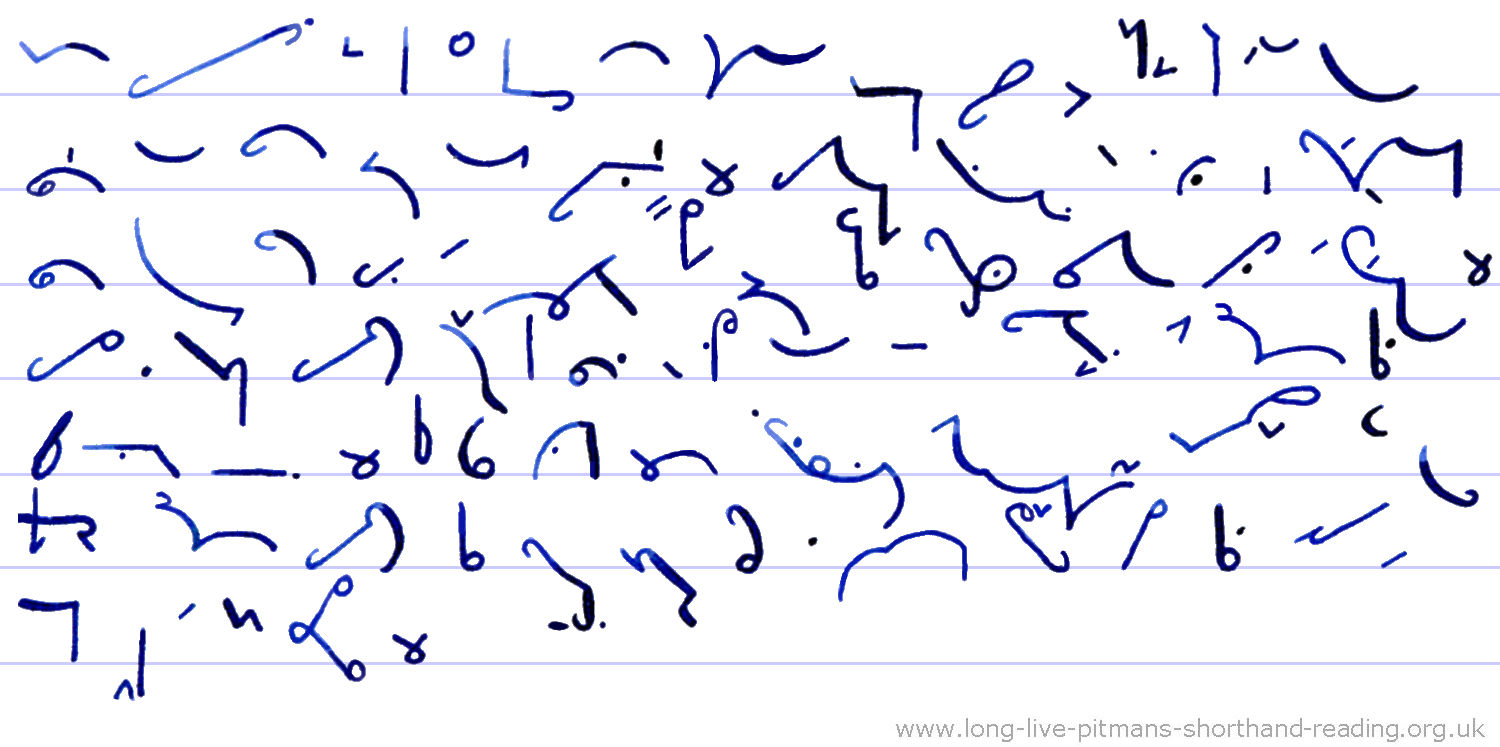
I am wondering why it has taken me so long to get used to the idea of it
not being summer any more here in the UK. We have had the benefit of a
late but prolonged* summer, after the very wet and miserable start to
the year with its persistent heavy rain and flooding. Once the better
weather arrived, it seemed to settle in quite agreeably, and the warm
days just kept coming. At first* this led to some complacency and
eventually I realised that, even at the beginning of warm weather, it is
prudent to remember that there is a limited supply of such days, and we
should get out and about as much as possible.
* "prolonged" Stroke Ing cannot be halved
* Omission phrase "at (fir)st"

Last burst of warmth
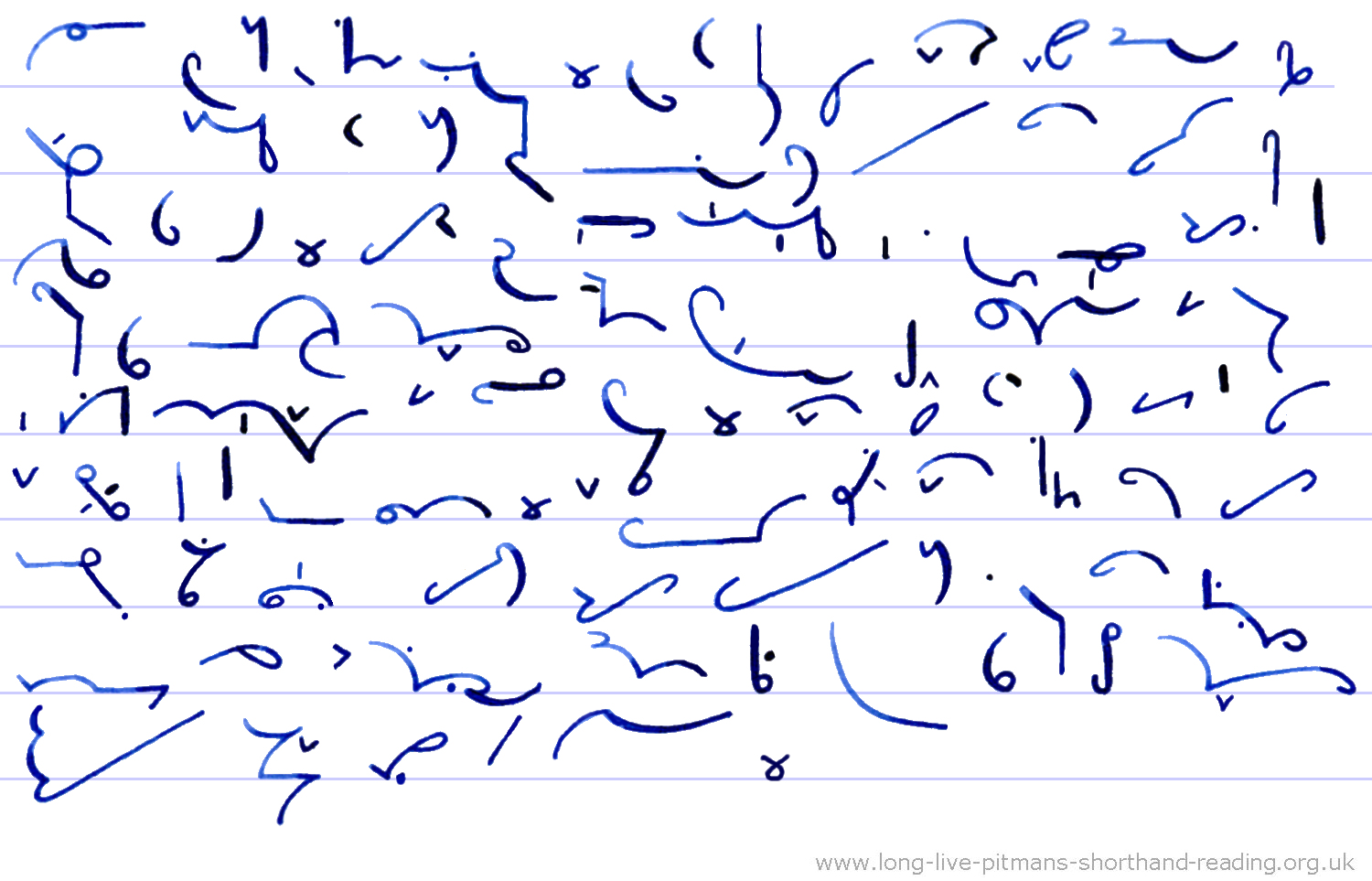
Last week*, however, I had to admit the inevitable*. Even though it was
still mild, whilst walking towards the bus stop I noticed that I was
kicking through rather more yellow tree leaves than usual. One or two* would have gone unnoticed*, but a few gusts of wind had brought these
colourful reminders of autumn fluttering down, swirling on the path but
held immobile* on the grass verges. My first thought was, "Oh well, I
suppose it had to come some time." I quickly adjusted* my attitude, from
one of expecting endless* summery weather to one where I was a bit more
determined to make the most of the remaining warm days, after this
sudden reminder that they were unlikely to last much longer.
* Omission phrases "las(t w)eek" "one (or) two"
* "inevitable" See
www.long-live-pitmans-shorthand.org.uk/distinguishing-outlines-5-care-e-n.htm
"inevitable unavoidable"
* "unnoticed" "immobile" Such negatives repeat the
stroke, to differentiate them when vowels are omitted
* "adjusted" There is no D sound, despite the spelling
* "endless" See
www.long-live-pitmans-shorthand.org.uk/distinguishing-outlines-2-rule.htm
"endless needless"

Summer's end
rose offering - tiny
but welcome
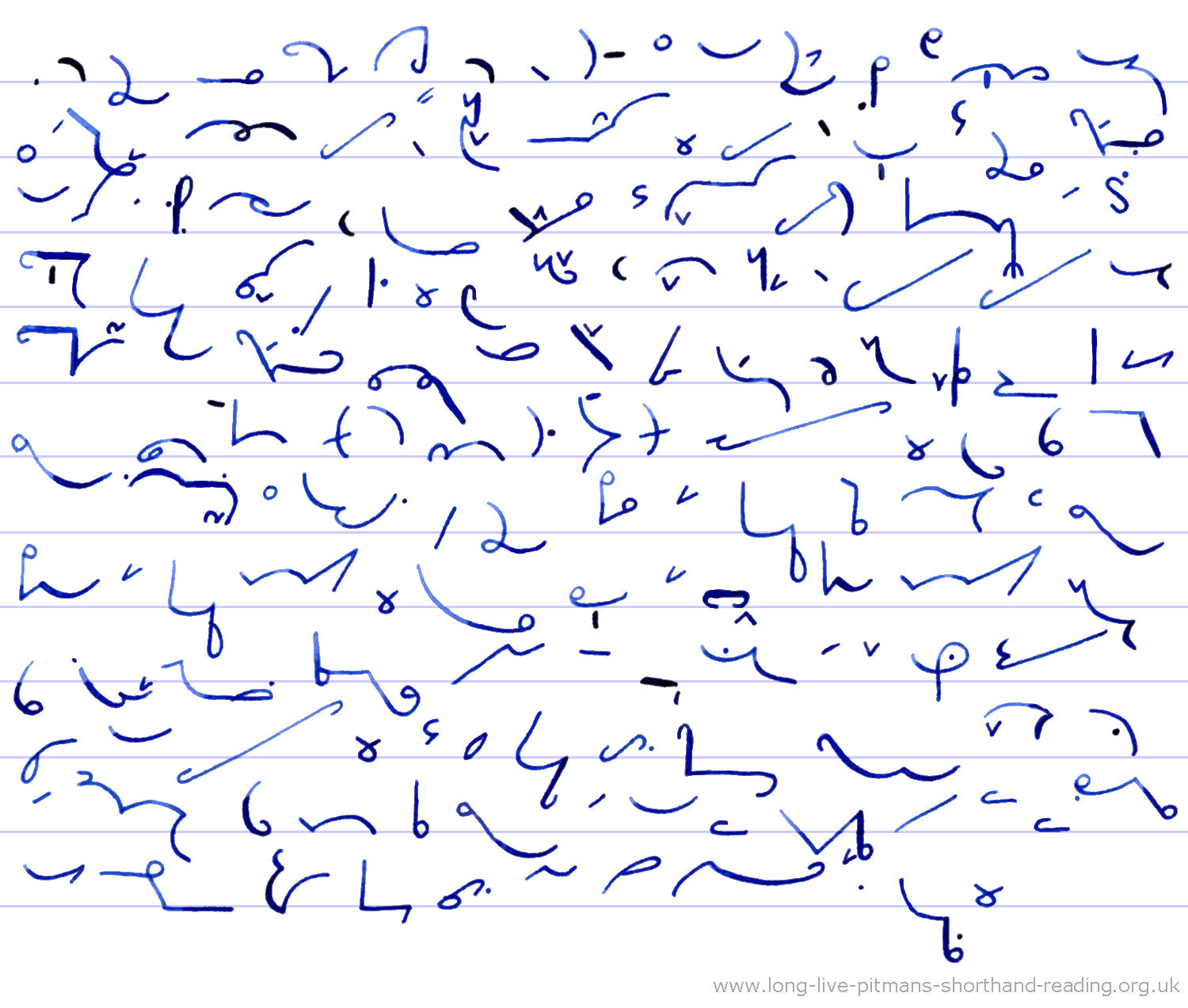
The word "season" comes from the Latin word "to sow" as in sowing seed,
as that moment in the year is obviously the most important* one to
identify accurately. We all know that the seasons progress in a steady
manner without fixed* boundaries, with the likely weather, temperature
and plant growth changing slightly each day. However, I find that my
idea of where we are in that gradual progression seems to be* influenced
by which of the four words I have decided to call it, spring, summer,
autumn (or you may say fall) and winter. Even this can be ambiguous, as
officially each season starts on the 21st* of its month, with spring
starting on the 21st of March. If there is snow on the ground at the end
of March, I feel that* these convenient and fixed descriptions* are not
quite good enough and I insist that we are still in winter. With the
first change of wind direction, bringing mild air and warmth, then to me
it is spring and any cold periods are called "cold snaps" in the
expectation* that they will take the hint and not last longer than a few
days.
* Omission phrases "mos(t) important" "seems (to) be" "I fee(l) that"
"longer (tha)n"
* "fixed, focused" Always insert
the first vowel, as they are similar in outline and meaning
* "21st" Stee loop for "first". If written on the N Hook side of a stroke, the
loop becomes "nst" standing for "next" as in "Monday next"
* "description" is a contraction, but the plural "descriptions" is a
full outline, this is because the plural outline could clash with
"discourse" which has a similar meaning
* "expectation" Optional
contraction

Nasturtium
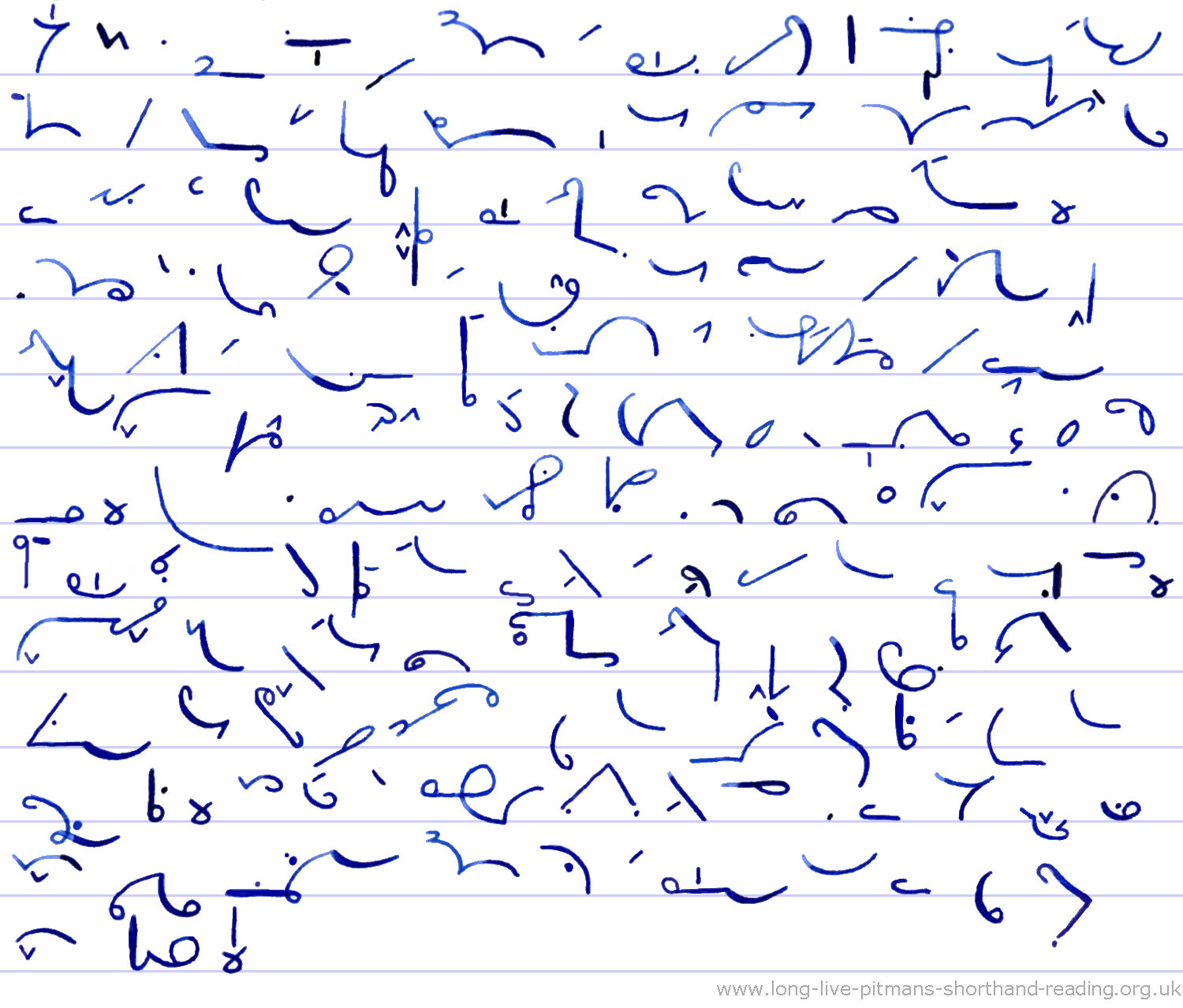
Until about a week ago, our warm and sunny* weather had extended* into
the "official autumn", which began on the 21st of September, but in the
last week the early mornings have been cold and wet, with everything
outside soaked and dripping from the overnight mist and fog. The remains
of a few roses and fuchsias in the garden are holding out and providing
red and pink dots of colour, and the nasturtiums are glowing like jewels
around the pond, although they will be the first to collapse when the
first frost comes. After a certain amount* of resistance, at last the
word "summer" has, like a lacy straw sun hat, been dusted off, cleaned
up and stored away for when it is needed again. Likewise I have put off
the summer cardigan and brought out the zipped fleeces, and will be
checking over the supply of wrist warmers, thin for cool breezy days,
and thick for freezing days. I am not fond of successfully wrapping up
against the cold only to find the ends of my sleeves exhaling warm air
and sucking* in cold, thus breaching my defences!
* "sunny" Always insert the vowels in sun/snow sunny/snowy
* "extended" Keep the T stroke vertical, so that it does not look like
"expanded" which has a similar meaning
* Omission phrase "certain (am)ount"
* "sucking" Insert the vowel sign and keep it clearly thin, as "soaking" has a
similar meaning
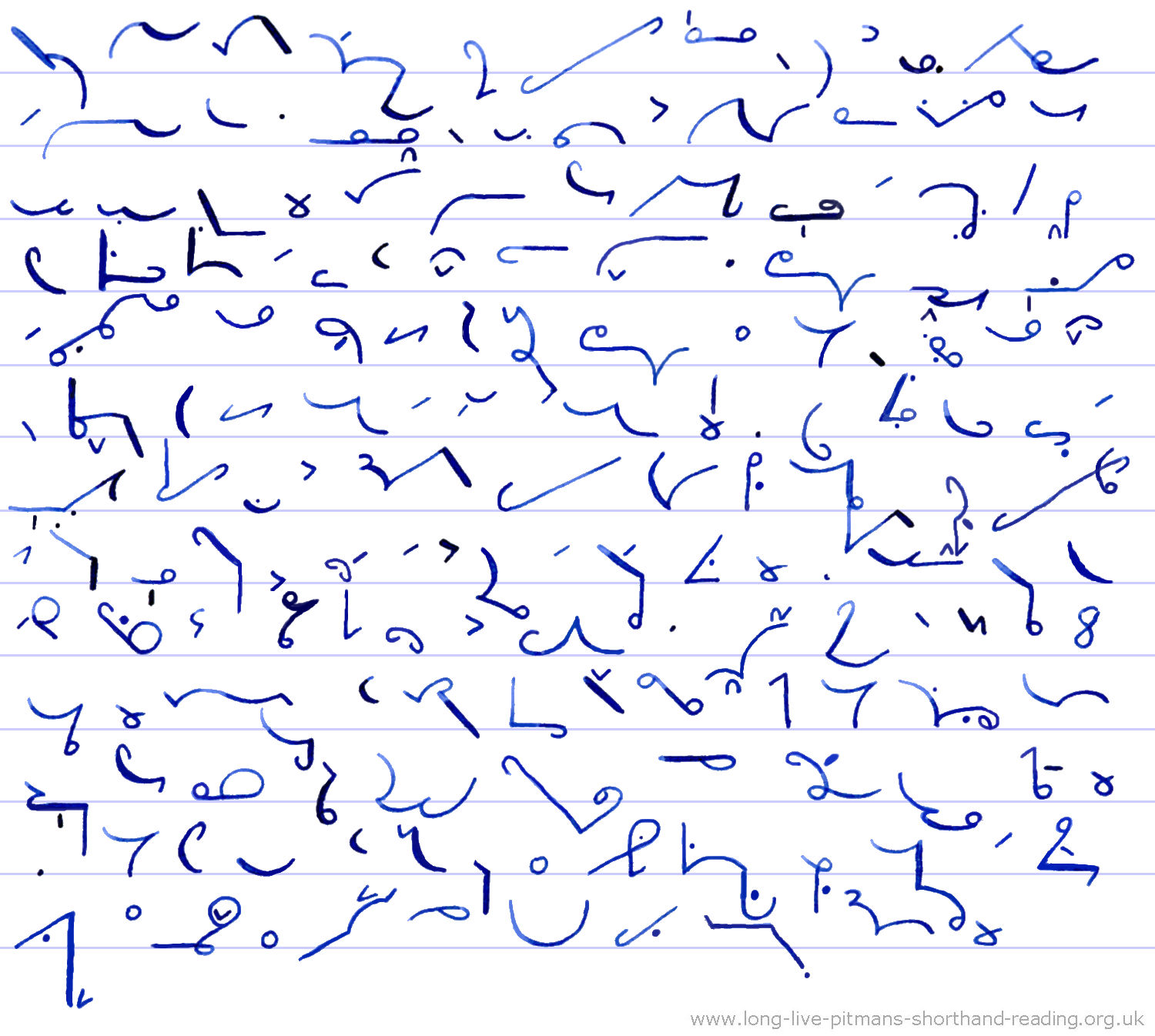
Before long I will be rummaging through the winter socks to see what
needs replacing, and looking for an excuse to knit some of the lovely
sock patterns in the new knitting book. I will look over the range of
gloves and mittens which suit every degree of damp and cold that might
occur, like a squirrel counting the acorns and hazelnuts in his store,
although I suspect* the squirrel has only two concepts in his mind to
describe them: "enough" and "not enough"! The thin jackets have been
cleaned and corralled at one end of the wardrobe where they will stay
undisturbed throughout the winter months, and the padded coats brought
to the front and all the zips and buttons checked. The ankle boots have
swapped places with the sandals at the front of the shelf, a mutual
journey of about eight inches. I am now confident that I will not be
taken by surprise, and it only remains for me to gloat over the success
of these essential preparations against frozen fingers and toes. The
only other thing that I have to do is resist the temptation to stay
indoors and hug the radiator, as exercise is really the most efficient
way of keeping warm. (836 words)
* "suspect" The contraction is only used for the verb, which has the
accent on the second syllable. The noun, with the accent on the first
syllable, has full outline.
Top of page
Matchsticks (16 October 2014)
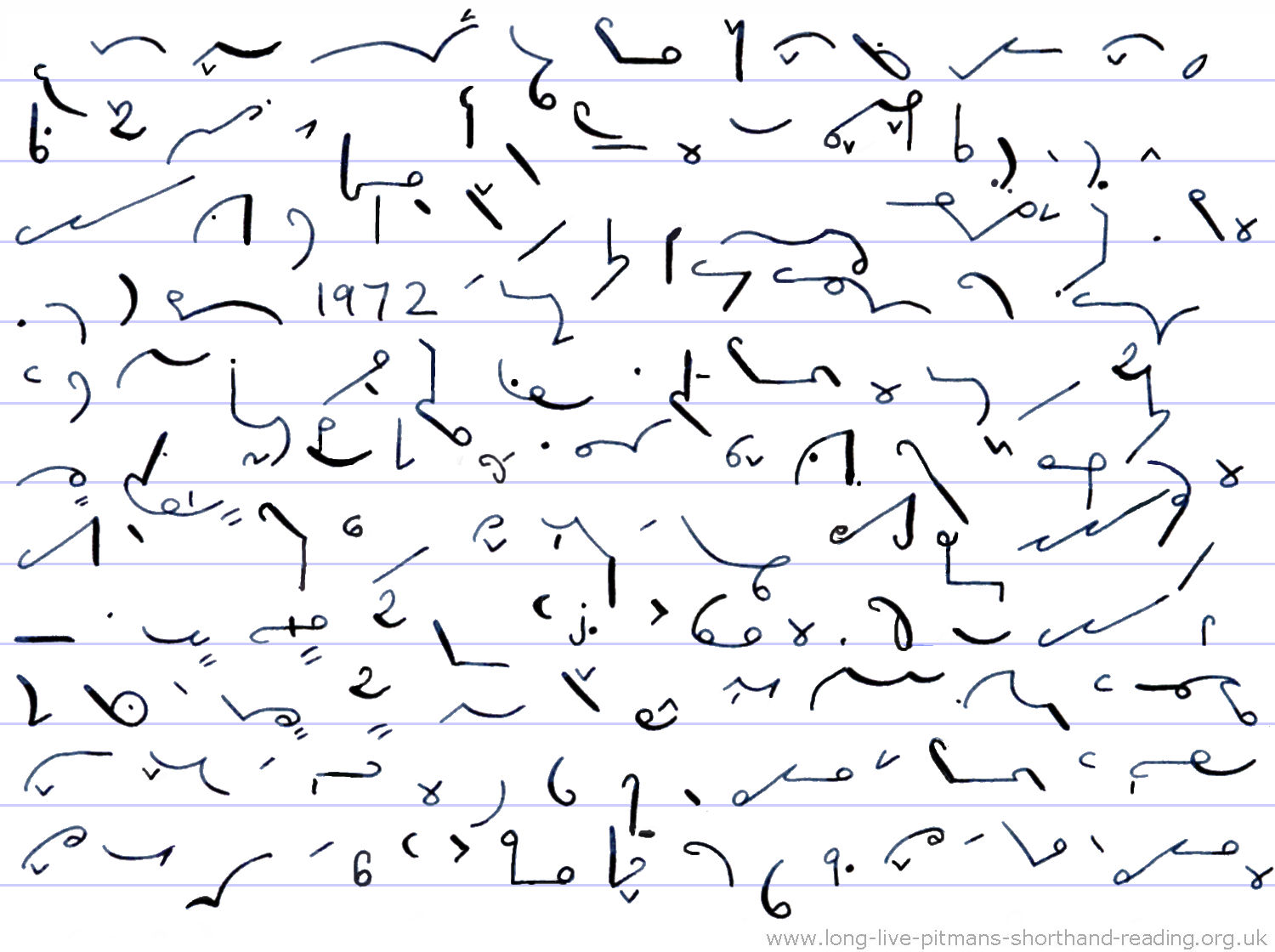
Whenever I am writing material for these blogs, I do my best to recall
my first days of shorthand learning and the difficulties that had to be
overcome. In hindsight* it is easy to see how we were led through it all
by our teacher, who had many years' experience of teaching the subject.
The year was September 1972 and I can see the college classroom very
clearly, with three long continuous rows of tables facing a double
blackboard. I can see our shorthand teacher, Miss Jefferson, standing at
the front, a small slight lady, probably about 60 years of age. We had
all brought with us our lined notepad and pencils, as we had been
instructed, and we were each given a New Course shorthand book that
contained all the lessons. The very first* thing we were told was the
basis of Pitman's Shorthand, written by sound and not the longhand
alphabet, with examples like "knife" and "cough". She then drew two
circles on the blackboard, with crossing lines in the middle, and told
us that all the strokes derived from these straight lines and parts of
circles.
* "hindsight" Note that "hind" on its own is written halved with N Hook
* Omission phrase "very (fir)st"
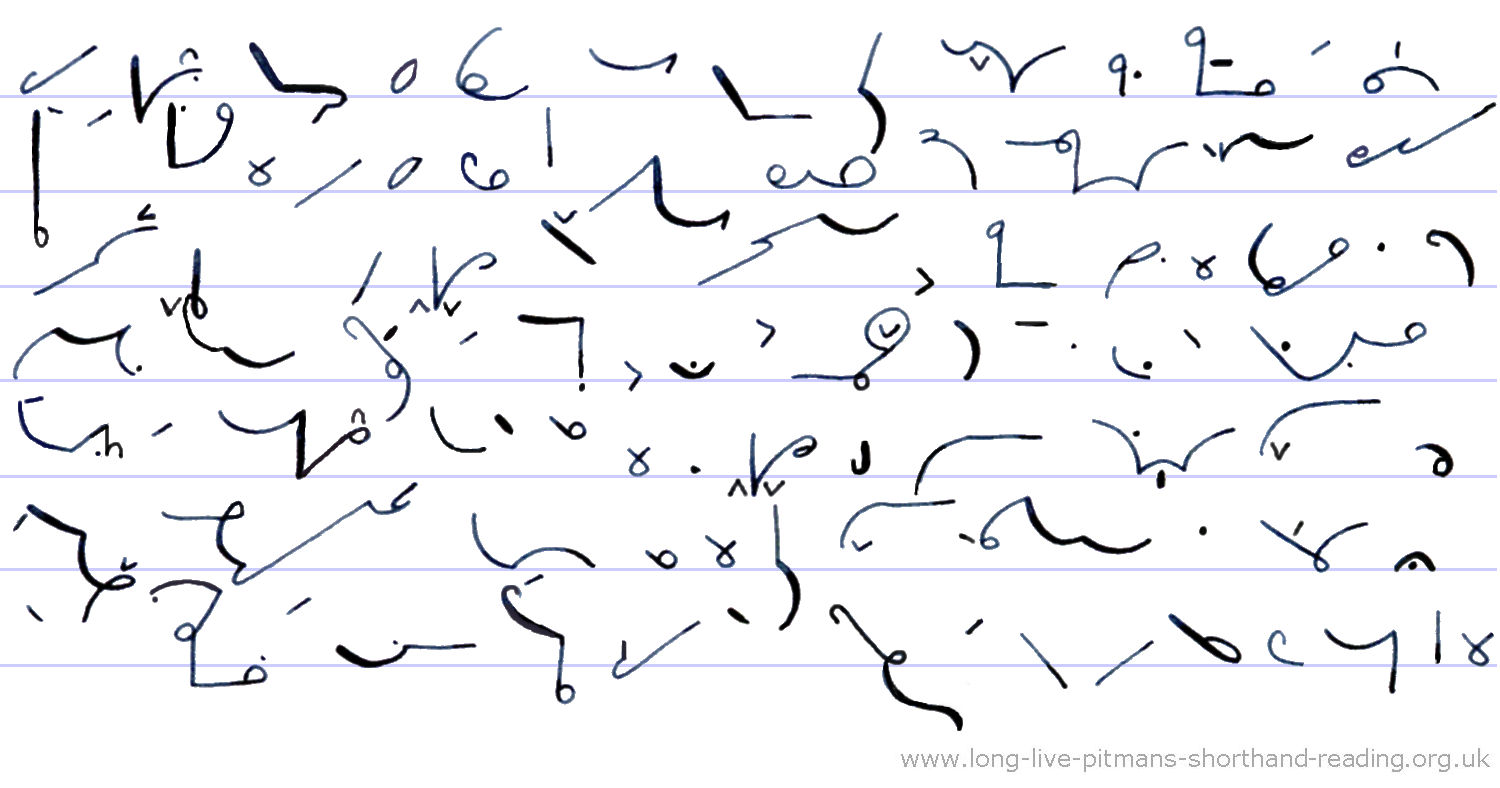
We duly began the first lesson in the book, which was entirely straight
strokes and some dots and dashes. Our first efforts at reading the
sentences were extremely halting, as we were really deciphering each
outline by referring to the stroke list. This was a very lengthy process
and getting to the end of the exercise was quite a feat of patience,
fortitude and endurance for all of us. The outlines did not look
remotely like words, obviously because they were not yet familiar to us.
It was like solving a puzzle made of matchsticks and ink blots, but we
all persevered and put our best effort into it.
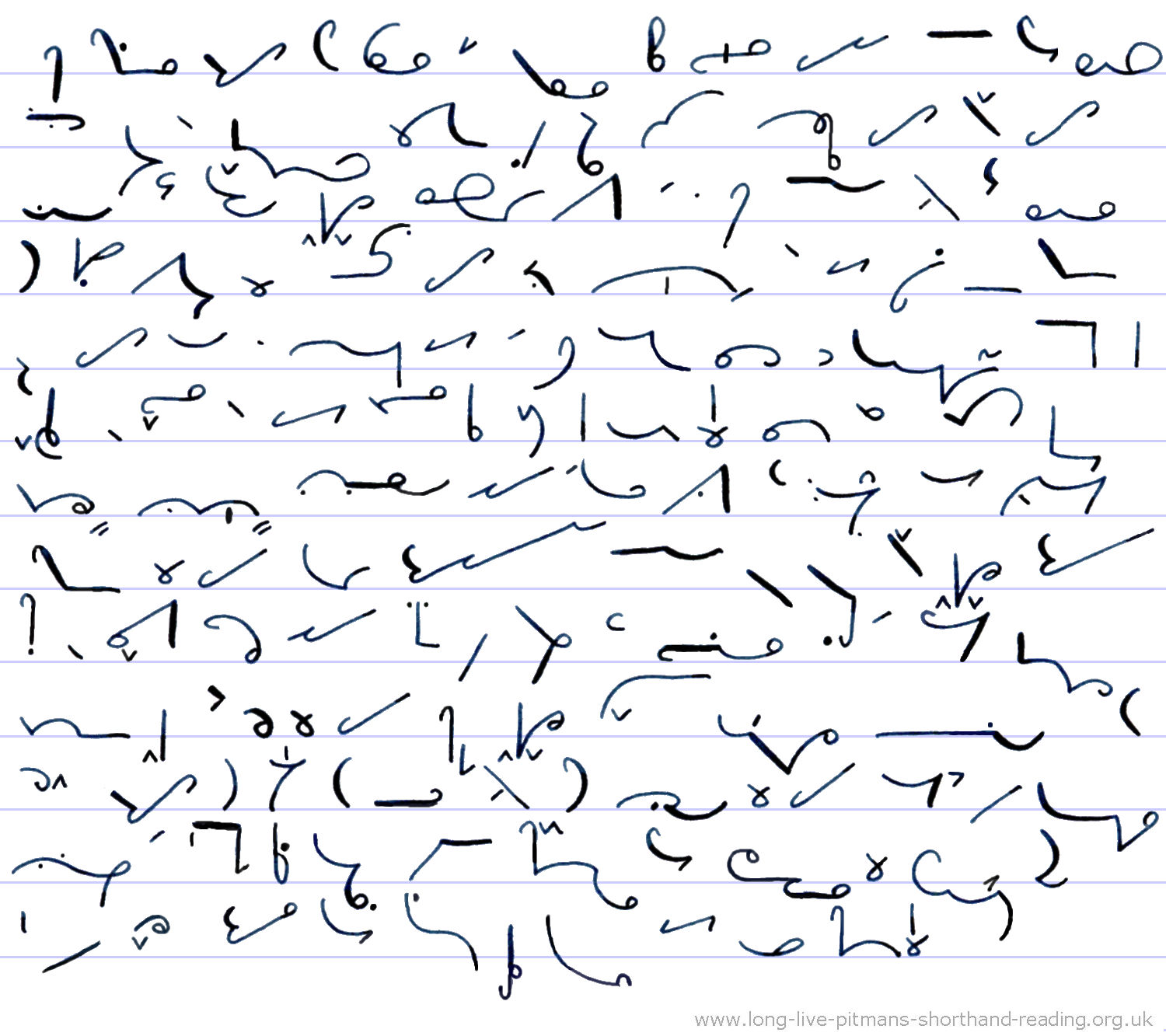
During breaks between other lessons on the business studies course, we
would go over the sentences again, full of determination to solve each
of these little mysteries one by one, ending with the final outline
successfully read, and a cheer going up that the sentence was at last
revealed. Occasionally one heard mutterings of, "We'll* come back to
that one in a minute" and sure enough, someone would eventually get it
deciphered, to cries of "Of course it is, I see it now". Some of us also
took the Pitman's Memo magazine, and we often read that communally in
the lunch break. We felt that we were not going to be beaten by outlines
that were trying to hide from us, and we attacked each passage with
eagerness and energy, determined to make out all the words. We treated
the outlines like footballs, kicking them around between us until they
gave up their meaning. We enjoyed our victories immensely and got the
taste for these* regular triumphs over the squiggles. Fluency was not on
our minds, that was for the far distant future - next term!
* "we’ll" Apostrophied phrases are written with full outlines rather
than short forms, and always vocalised
* "for these" When phrased, insert the vowel when "those"
and "these" are
out of position, as they are both plurals, and leaving "this" unvocalised, so that all three are covered for legibility.
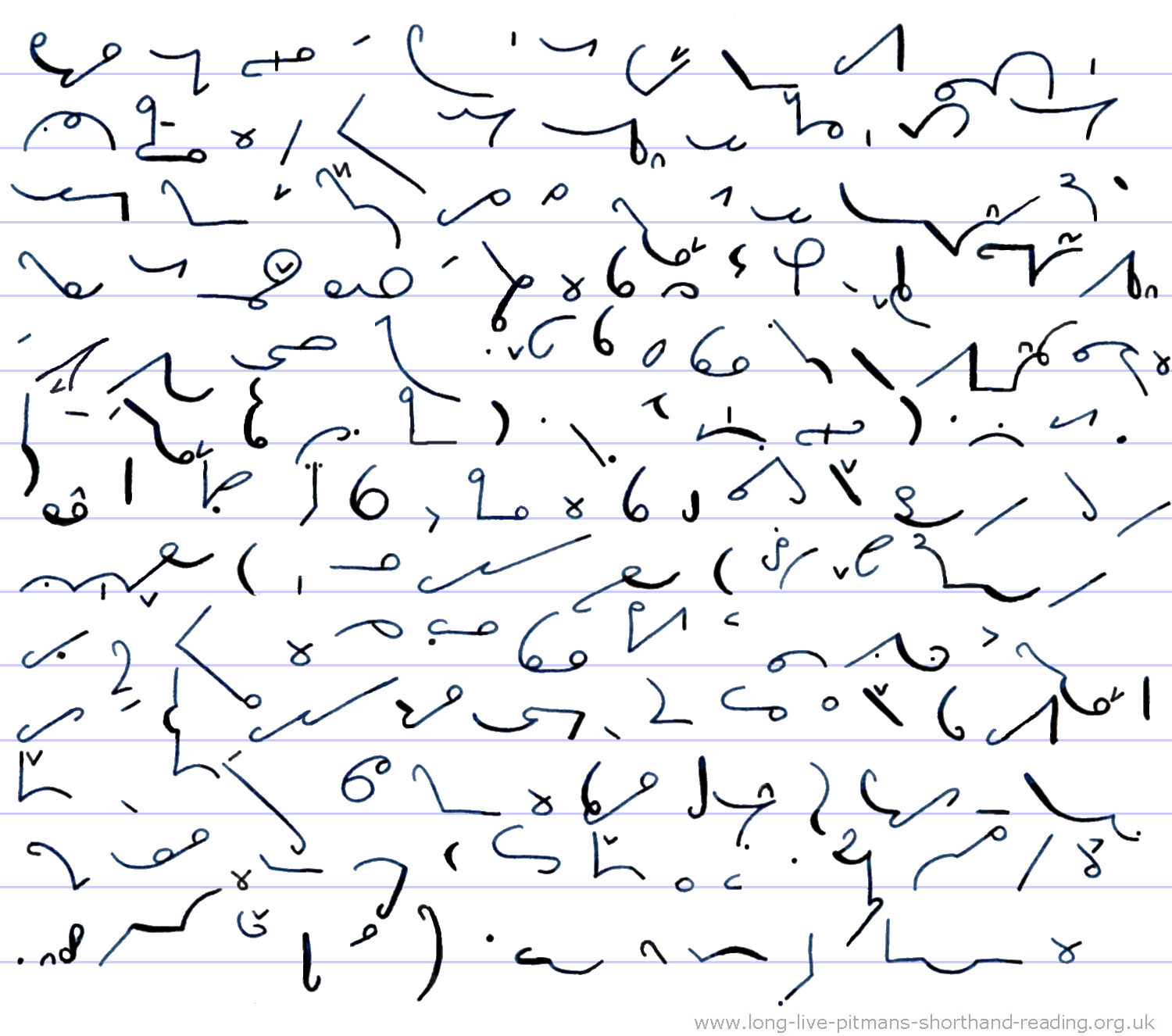
Several weeks* into the course, and further on in the theory book, we
had similar but lesser struggles. Each chapter not only introduced new
items, but also naturally included practice on the prior ones, as the
previous and the new vocabulary were all present in the exercise
sentences and passages. This meant that the necessity to decipher
gradually* reduced and real reading increased, and after a while those
first lessons appeared to be ridiculously simple. It was quite obvious
that this leaning stroke was a P and that humpy curve was an M, the
sounds had at last* attached themselves to the strokes. This did not
happen by spending hour upon hour memorising them, but because we were
using them constantly whilst working our way through the chapters. Most
class lessons started with some revision of the previous one, and at
that time we were always encouraged to ask questions*, as by then we had
had time to ponder as well as practise. This was done communally so that
everyone could benefit from the answers. I can imagine that question
time is when a shorthand teacher learns which points the students
regularly find difficult, and is therefore a golden opportunity to
improve teaching technique.
* Omission phrase "several wee(k)s"
* "gradual, gradually" are written with full strokes, to differentiate
them from "greatly"
* "at last" "at least" Always
insert the vowel
* "question" Optional contraction
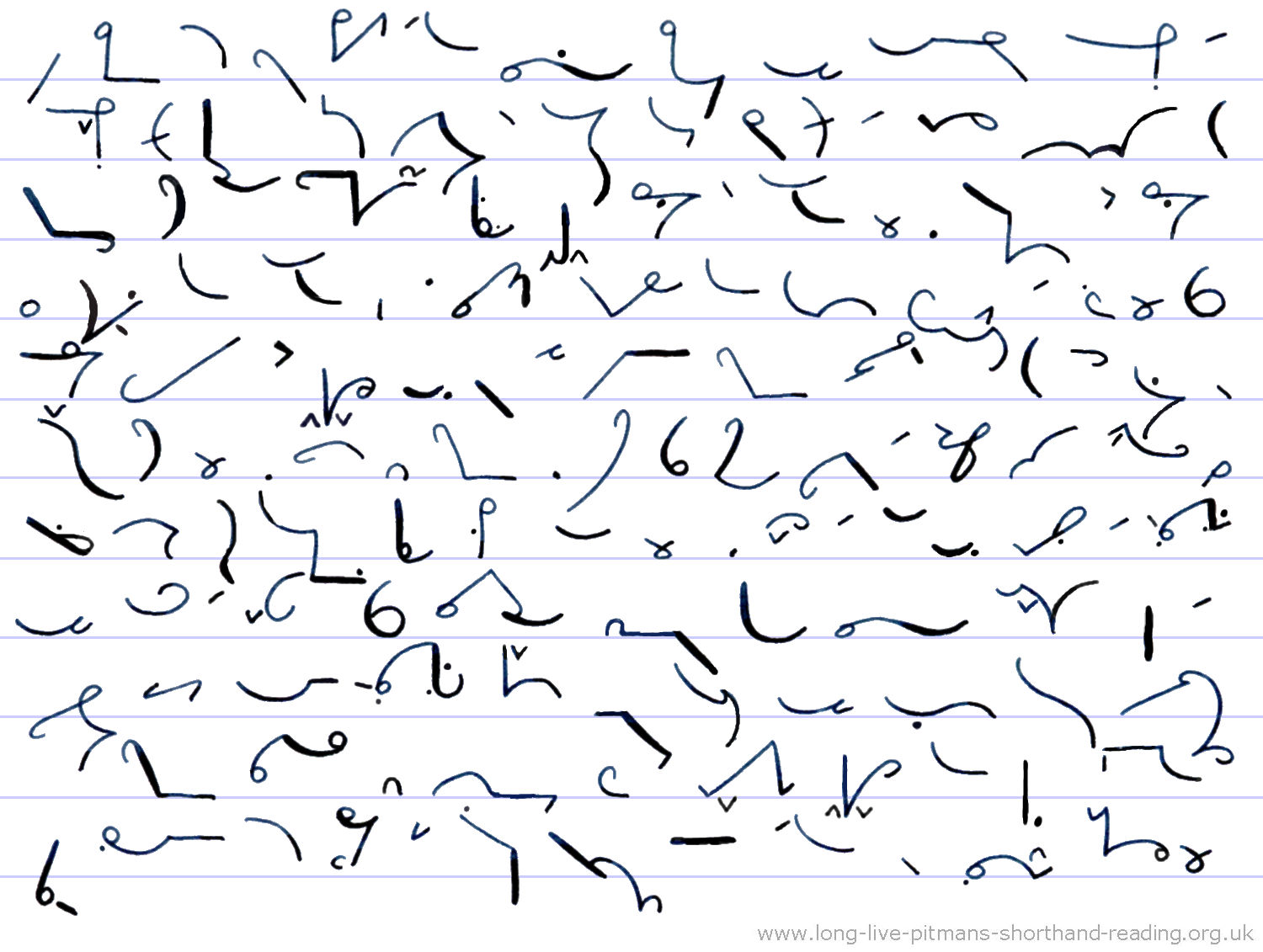
Each stroke or principle started off seeming* strange, new, unexpected,
interesting and exciting (depending on your level of enthusiasm for the
subject) and almost immediately they began their gradual descent down
the scale of novelty. The bottom of the scale is zero for novelty, but a
hundred per cent for familiarity, fluency and comfort. This is exactly
where all the outlines need to be, and with regular practise and use,
they cannot fail to arrive there. The more you practise, the shorter
this journey will be and I would suggest little and often is the best
method, so that fatigue does not set in. The mind and hand need to rest
and consolidate the new information, and while this is happening, you
can be doing something entirely different and useful, in fact*,
consolidation time could be the fancy new name for your refreshment
break, as long as you make the effort to write the outline for tea,
coffee, juice, snack or sandwich on the pad before you go off to consume
the items.
* "seeming" Insert the vowel, as "something" would also make sense here
* Omission phrase "in (f)act"
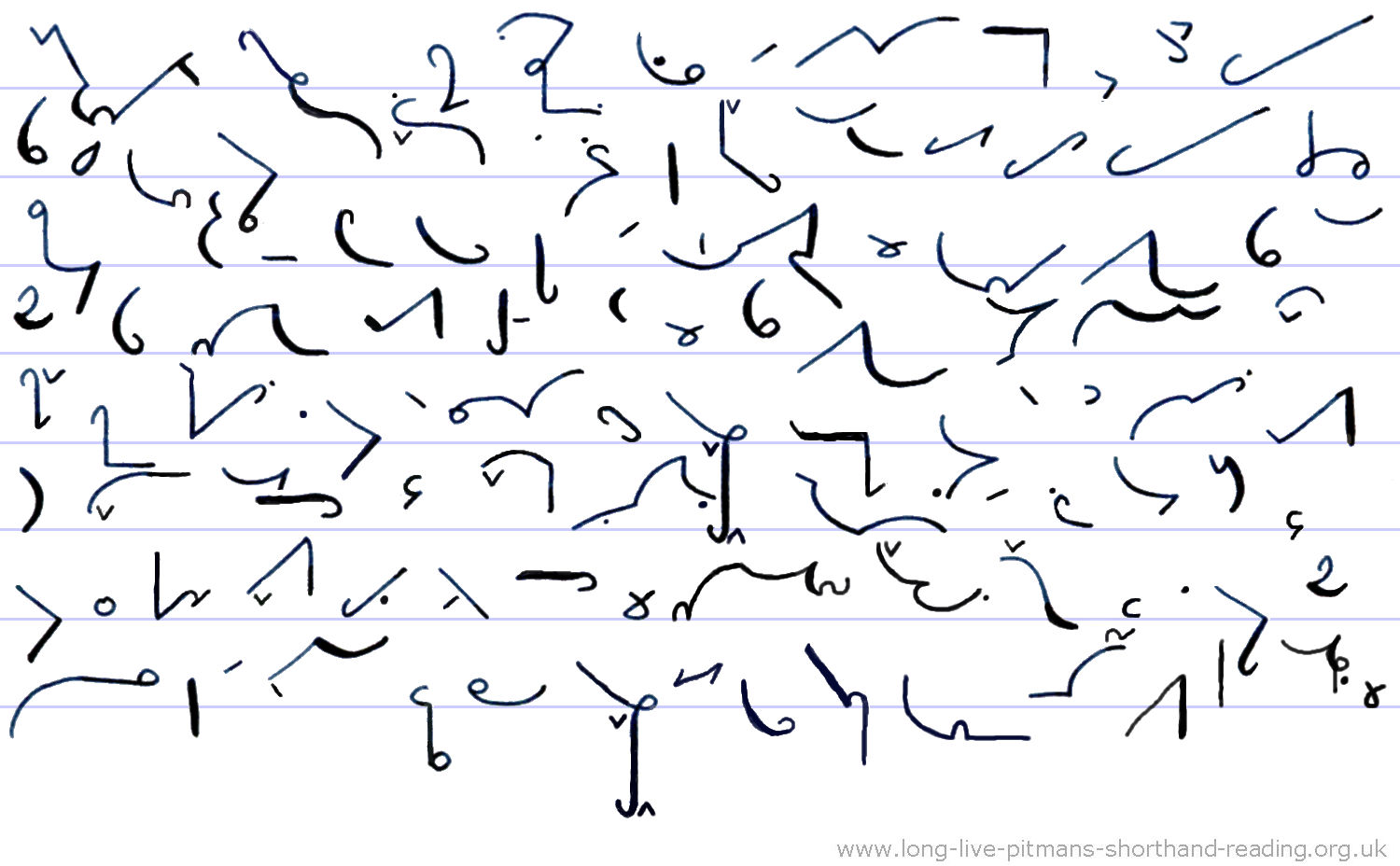
I hope that you are able to persevere through the "matchstick" phase,
and rapidly get to the point where those first few pages acquire a
completely different type of novelty, one where it seems strange that
they could ever have been difficult and unreadable. If you are reading
this in shorthand, then you will have already done that. Those reading
only the longhand might try the trick of turning a page of small print
upside-down to get the feel of what learning to read was like in the
beginning, with the mighty relief of familiarity and comfort for the
eyes when the page is turned the right way up again. You will know that
you have finally arrived when a page of shorthand looks different and
wrong when it is seen upside-down, even better if you can actually read
it in that state. (1005 words)
Top of page
Not Guilty (22 October 2014)
A little adventure to get you some practice in legal vocabulary. An
additional list is appended at the end.
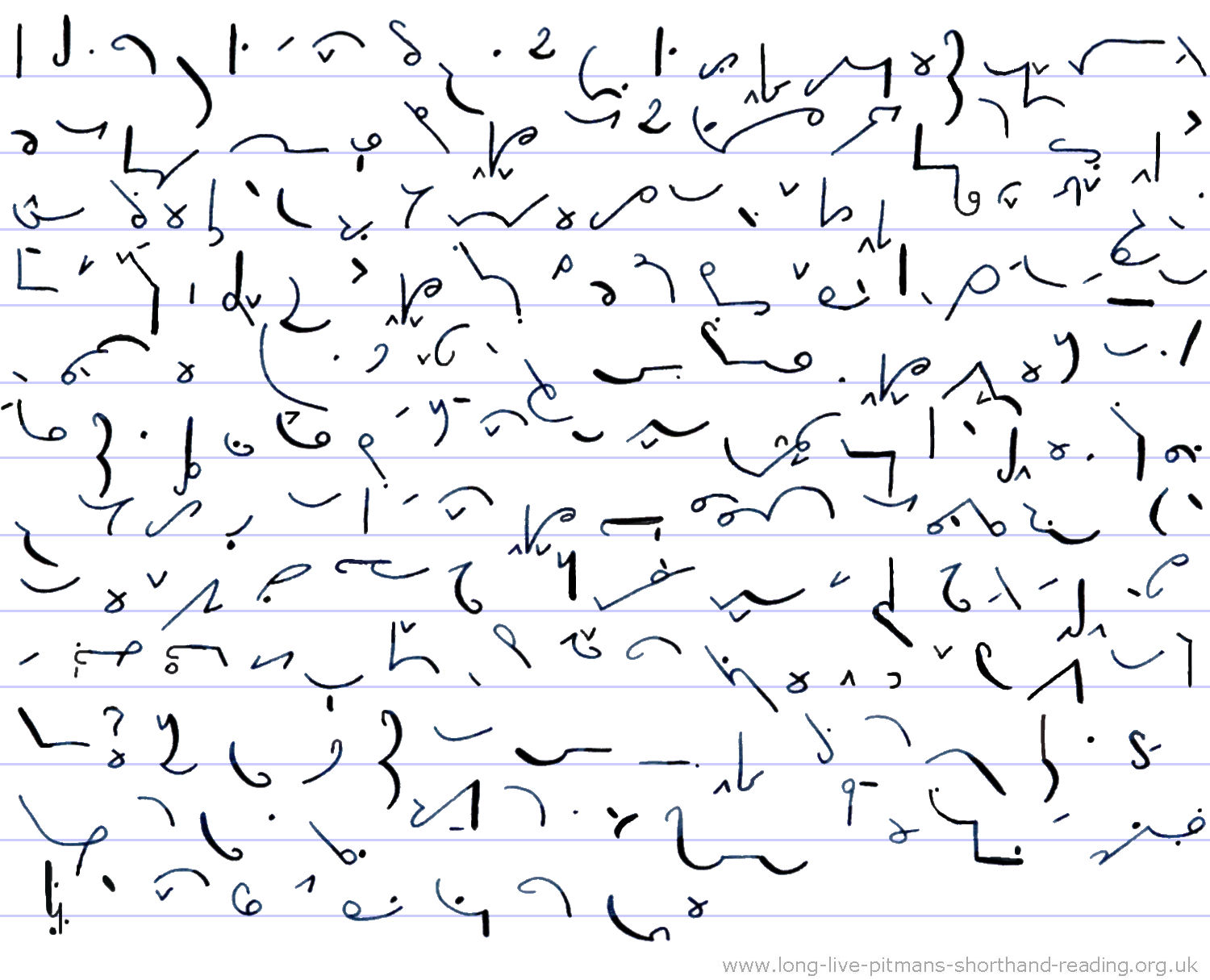
It had been a very busy day and my plans to have a shorthand themed day
went out of the window. There was no time to look up words in the
dictionary, make notes of special outlines in the shorthand folders,
record the dictations or clean out all the fountain pens. It would all
have to wait until tomorrow. Once in bed I turned out the light and
tried to listen to a talk on the Ipod*, but, despite seeing all the
outlines appearing as the words were spoken, I soon had to switch off
and give in to slumber. After a short while of peaceful inky blackness,
the outlines reappeared. I was in a large office, there was a distant
faint voice speaking and I saw my hand writing furiously to get it all
down. The pad seemed to have only one sheet in it and my outlines grew
smaller and smaller* in the hopes of fitting them all in. I reached the
last corner and then I had to resort to writing on the table, and then
up and down the walls and across the carpet, no time to stop and find
more paper. How would I ever read any of it back? I was not even sure
there was any ink coming out of the pen, or maybe it was a blunt pencil,
or even a piece of wood or an old drinking straw. Fatigue and weariness
defeated all my efforts and the scene faded from view.
* "Ipod" and "Ipad" Always insert the
second
vowel
* "smaller and smaller" The first stroke is repeated in phrases like this, but it would be
equally acceptable here to join them together "sm-smaller"

As fast as possible
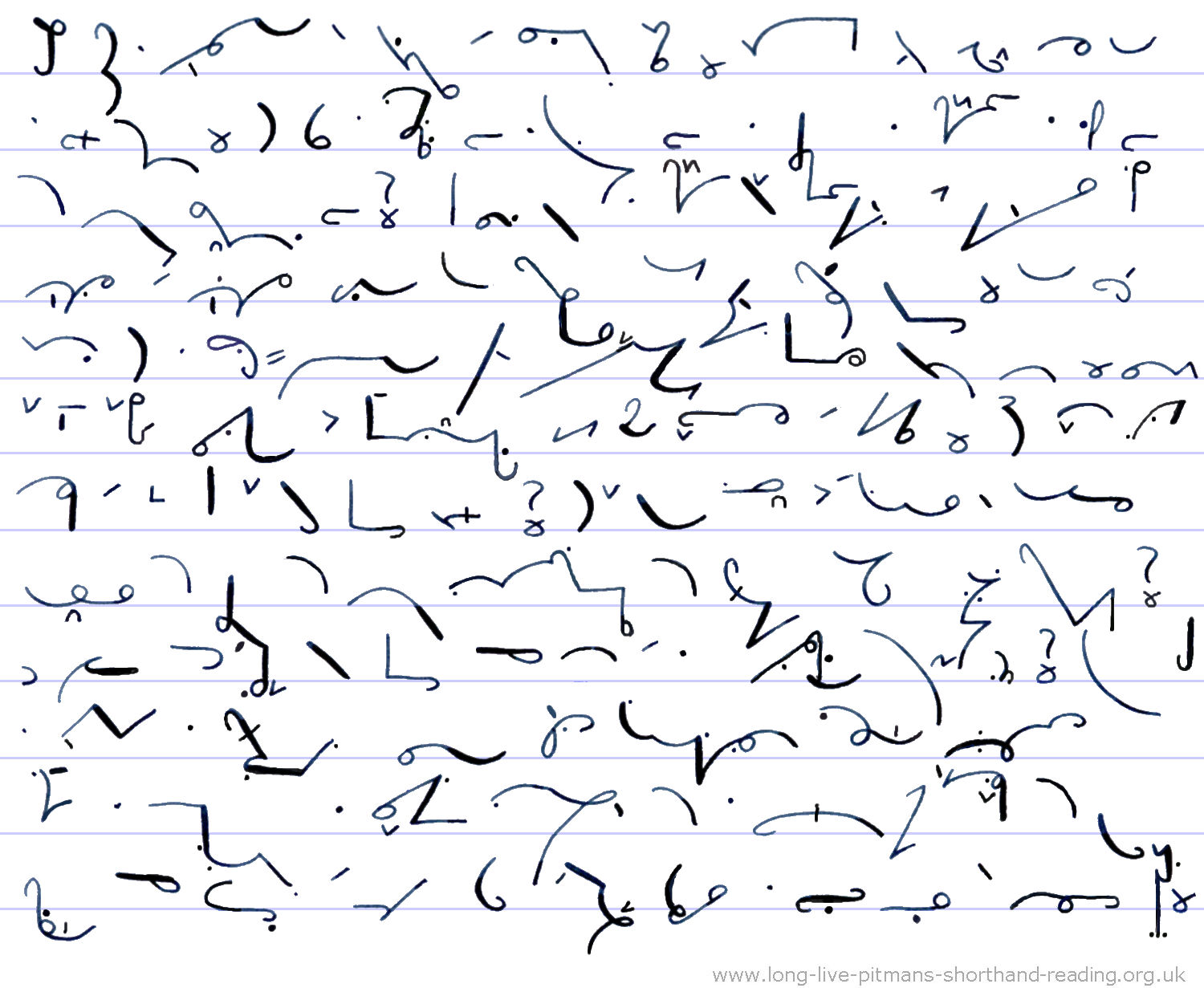
All of a sudden* there was a rustling of papers and scraping of chairs.
I looked up and found myself in a court room. Was this a Magistrates
Court, a Federal Court, a District Court, a Trial Court, a State Court
or maybe the Supreme Court? It seemed to be a trial by jury, and the
jurors sat motionless and emotionless*, waiting for proceedings in the
judiciary process to begin*. In front of me was a stern-looking judge,
rearranging the documents before him. Somehow I caught sight of the
heading of the documentation: Shorthand Crimes and Charges. What was my
alleged misdemeanour* and why had I been taken to court? Was I being
accused of the offence of negligence, nuisance or disobedience, or maybe
malpractice or forgery in relation* to intellectual property? Would
legal action be taken against me and a restraining order issued? If
there* had been a robbery, a burglary, something stolen, vandalism,
arson, embezzlement, assault, a kidnapping, a hijack, manslaughter or a
murder/homicide, or even treason against Queen and country, then
obviously this was a grave case of mistaken identity.
* Omission phrases "all (of a) sudden"
"in (re)lation (to)"
* "emotionless" Insert the first vowel to distinguish it from
"motionless"
* "to begin" based on the short form phrase "to be"
* misdemeanour" Optional contraction
* "If" can be doubled or halved in phrases e.g. "if there/their" and "if
it", but "for" is not doubled or halved, this ensures no misreading
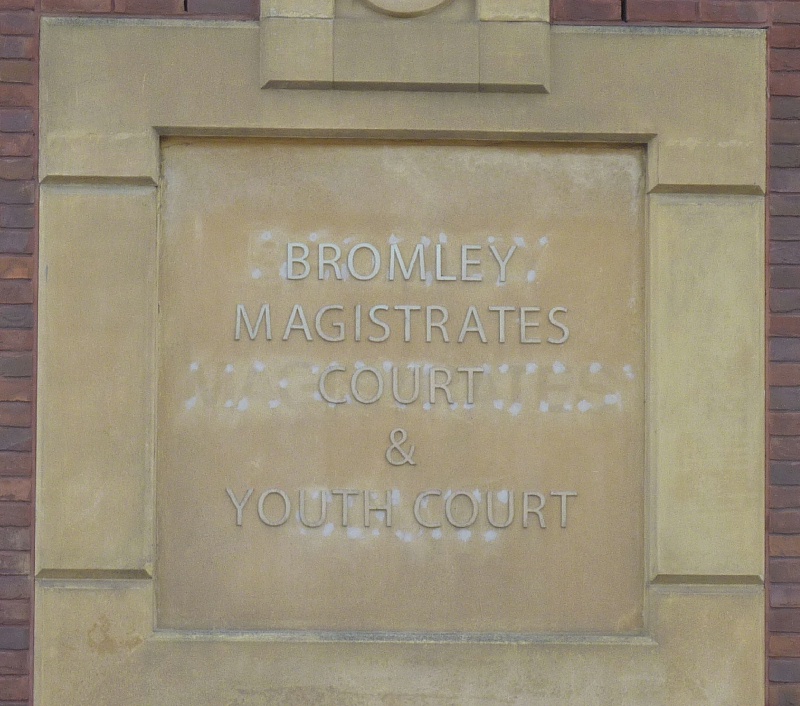
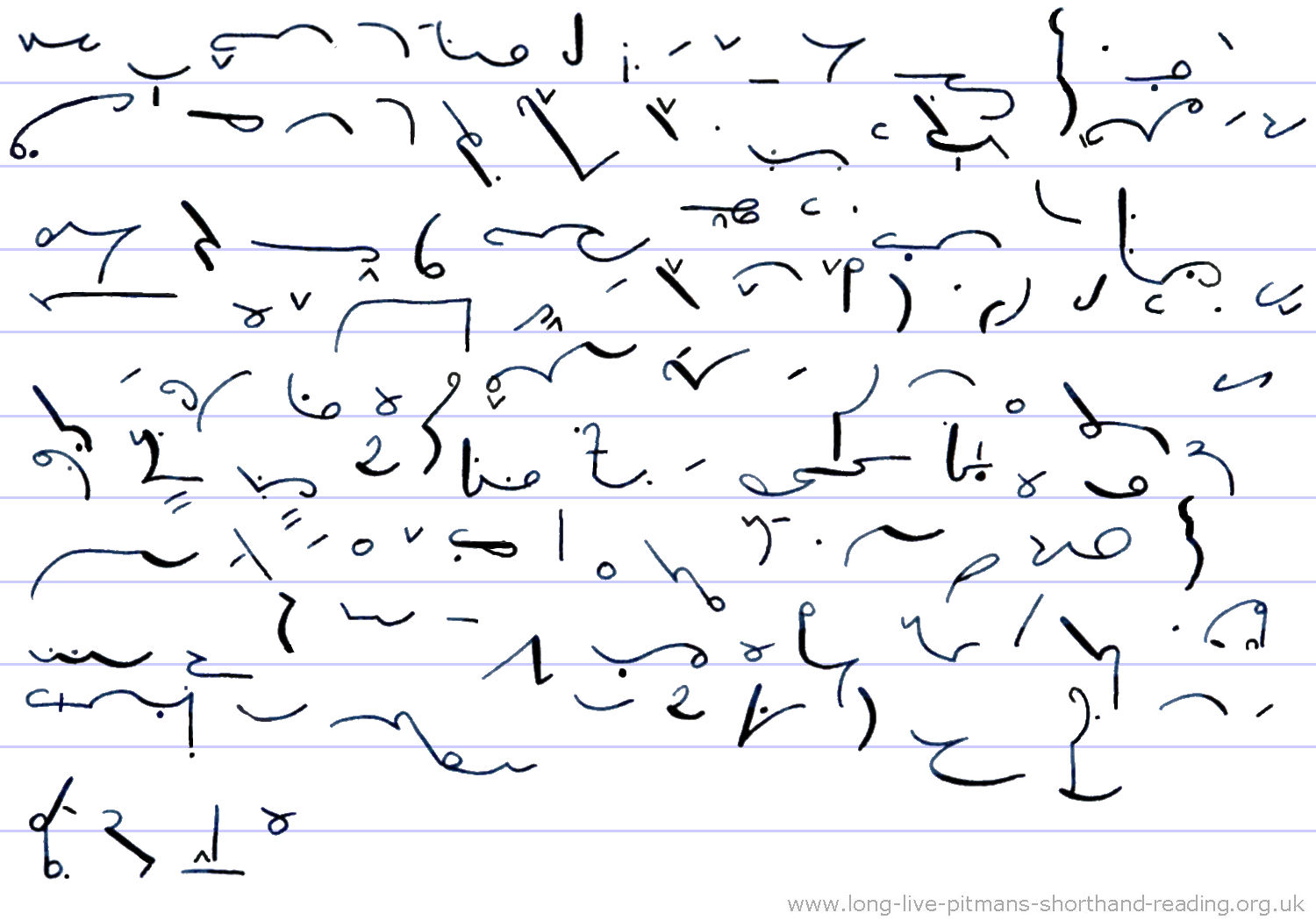
I knew no crime or offence had been committed, and I could only come to
the conclusion* that it was a case of slander against me, or possibly
bribery by an enemy with bankrupt morals, and I would certainly be able
to counter these criminal accusations with a claim for defamation of
character. I looked round and by my side was an oldish* gentleman with a
white beard and friendly face. He was smiling broadly and showed me his
business card: Sir Isaac Pitman, Shorthand Defence Attorney and
Stenographic Advocate. Things were looking up and as I glanced at his
papers, I saw a long list of witnesses that he was intending to call,
although I could not quite read the names. Suddenly I felt much better,
a lawsuit culminating in imprisonment* in shorthand jail was no longer
threatening me and justice would be the outcome.
* Omission phrase "come (to the con)clusion"
* "oldish" both strokes are written downwards
* "imprisonment" Note "-ent" is used for "-ment" where the halved M
would not join clearly
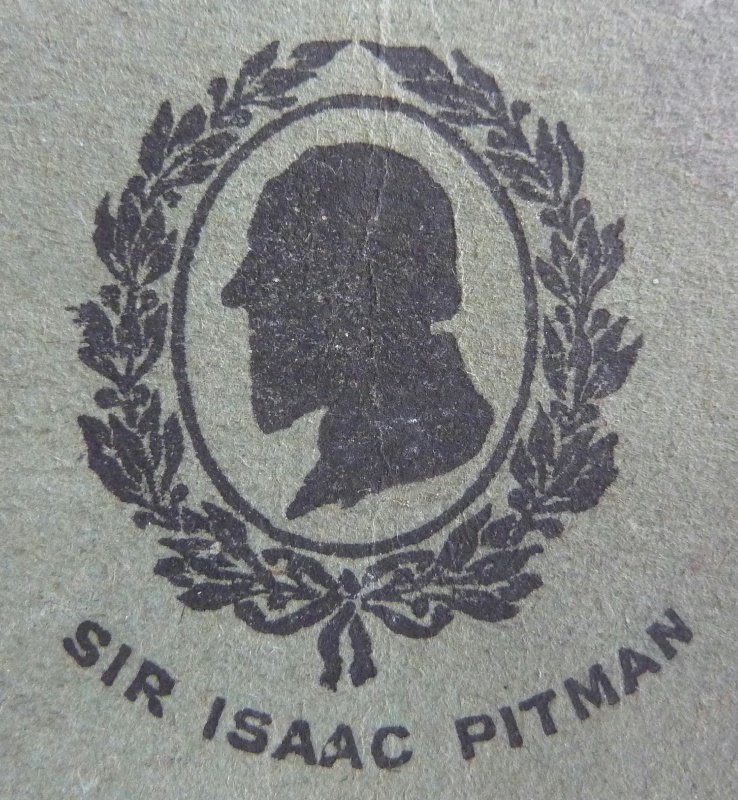
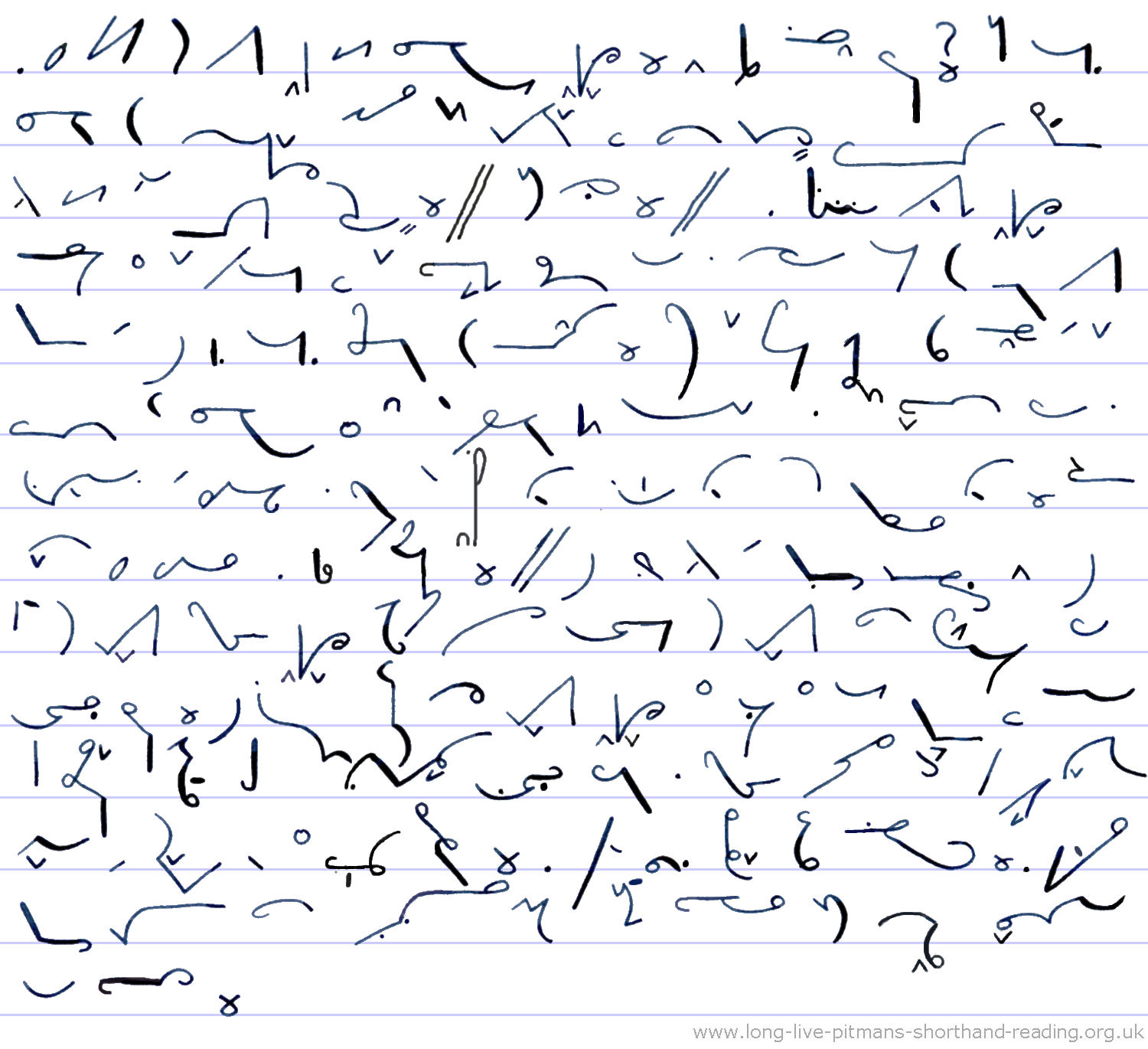
The first charge was read out: Scribbling the outlines. How does the
accused plead? I had indeed scribbled them many times and was about to
reply, when Mr Pitman quickly spoke up, "Not Guilty, Your Honour." I was
amazed*. "The defendant* wrote the outlines exactly as I recommended
when I created the system, in a manner in which they could be read back,
and she did indeed transcribe* them accurately. Therefore I challenge
and dispute this accusation and I claim that scribbling is, beyond all
reasonable doubt, neither a crime nor a felony, and certainly not a
breach of statute law, common law or business law. I call my first
witness, the defendant's* shorthand teacher." She stepped up and began
to explain how she taught us to write perfect outlines, and then later
on encouraged us to write more flowingly in order to* increase speed. She
confirmed that it was impossible to write outlines as neatly as in the
book when going at high speed, and that those had been laboriously
engraved in order to be* a perfect reference point, which real life
writing should aspire to as closely as possible. The judge seemed
satisfied with this explanation*. The jurors began to look more relaxed
and I think I saw the corners of their mouths smiling in agreement.
* "amazed" "amused" Always insert the vowel
* "defendant" This is the full outline but the optional contraction
"d-ft" is used in the remainder of article
* "transcribe" omits the second R, so that it does not look
like "describe"
* "explanation" Keep the L Hook clear, so it does not look like "expansion" which can
have a similar meaning in some contexts. Helpful also to insert the
vowel after the N.
* Omission phrase "in ord(er to)"
"in ord(er to) be" Not using the third place short form phraseogram "to
be"
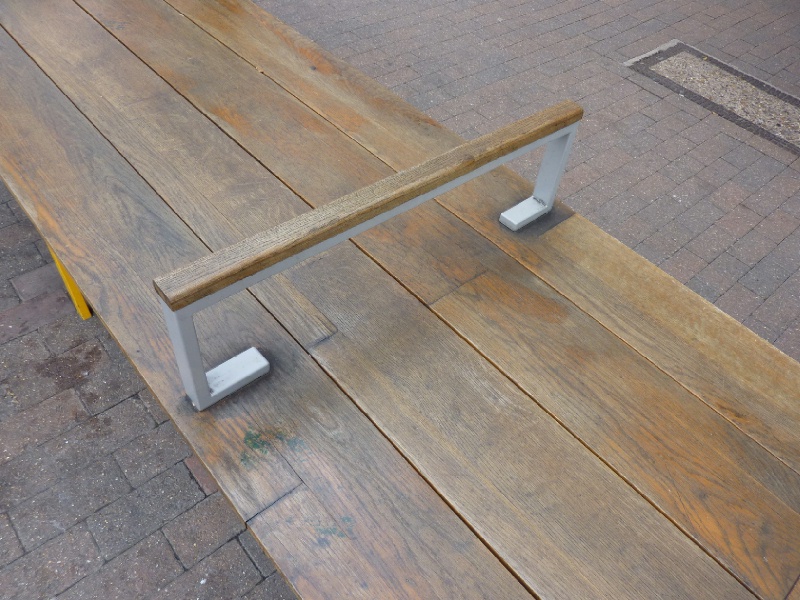
The Bench and The Bar (bus stop seat)
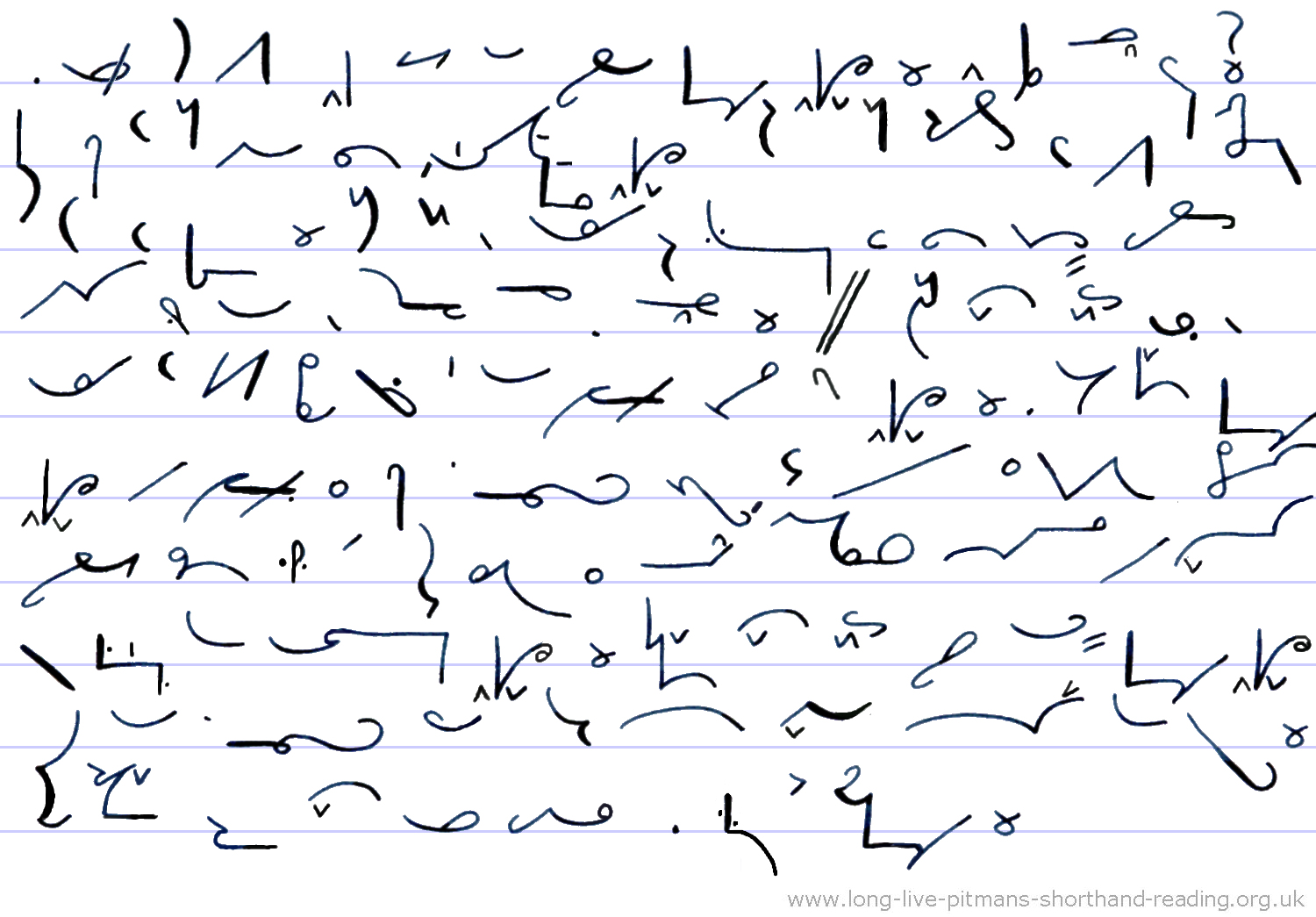
The next charge was read out: Not using dictionary outlines. How does
the accused plead? It was true that I had written some unorthodox* outlines, although I had always been able to read and transcribe them
without difficulty. I was about to answer to that effect, when Mr Pitman
once again* rapidly stepped in to argue against the accusation. "I do
not think my client needs to answer that charge, as it is not based on
any legal requirement to use particular outlines. The only time
dictionary outlines are legally required is during an examination, to
prove that the writer has performed satisfactorily using the system
stated and so that the certificate is accurate, and in those cases marks
are likely to be deducted for incorrect outlines. At the time my client
used non-dictionary outlines, she was not in an examination nor, for
that matter, writing material for publication. I would like to call my
next witness, the editor* of the shorthand dictionary."
* unorthodox" Note that "orthodox" is a contraction
* Omission phrase "wu(n)s again"
* "editor" Special distinguishing
outline

Hemming me in
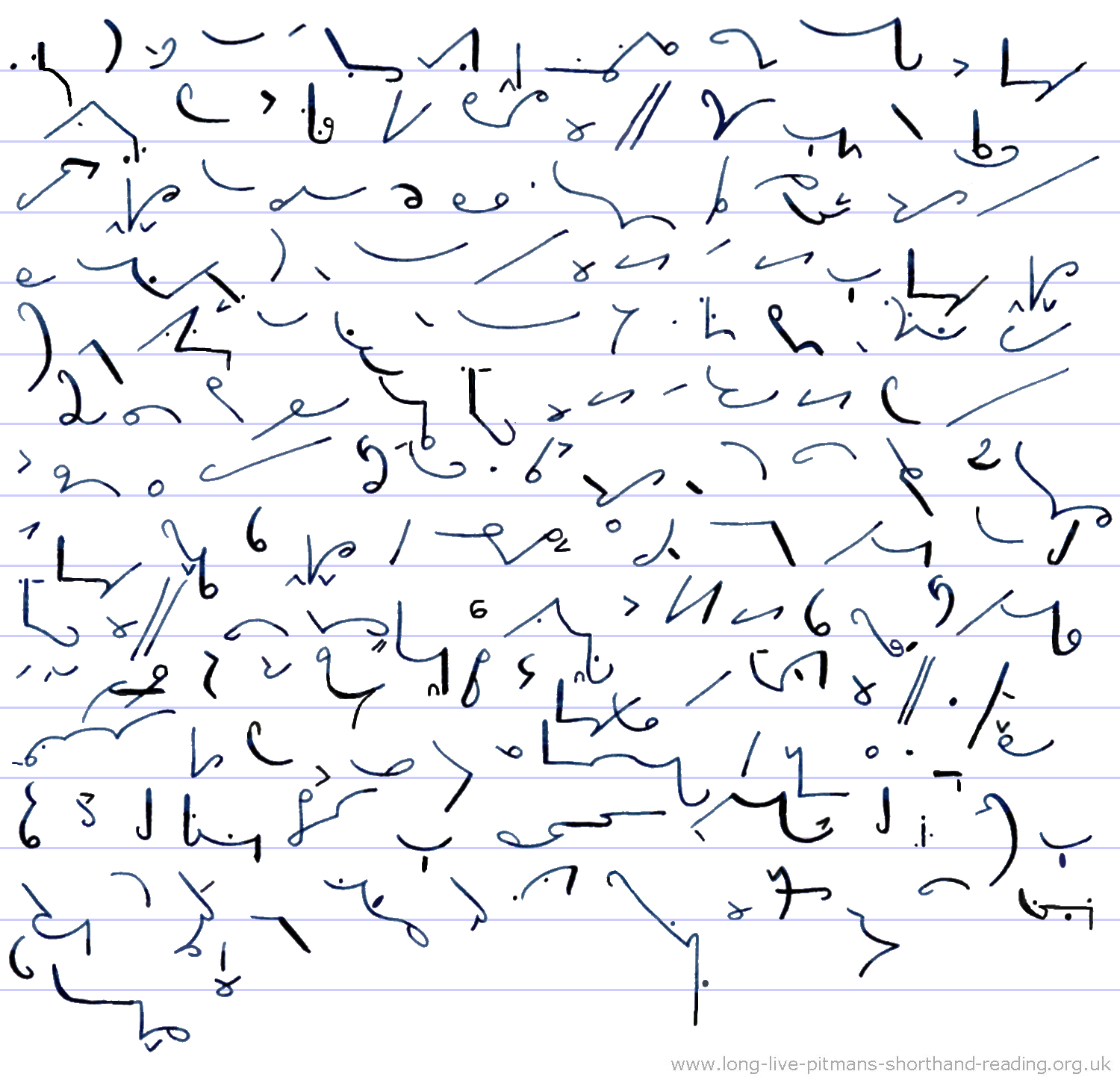
The editor* was ushered in and began to read out excerpts from the
introduction to the dictionary, repeated over all the editions, which
are as follows. "There will no doubt be differences of opinion with
regard to the outlines for certain words, since a form which is the most
convenient to one writer is not invariably so to another writer," and
"No dictionary outline, therefore, should be rejected in favour of
another until an attempt has been made* to ascertain whether there is
not some special reason for its adoption," and finally "Every writer of
the system is aware that there is often a choice between two or more
possible shorthand forms, and the dictionary provides those outlines
which experience has shown can be recommended for general adoption." Mr
Pitman continued with his refutation of the charge, "This proves that
they are recommendations and not legal requirements although I would
strongly suggest that the dictionary forms are followed." The judge
solemnly turned over to the next page of his documentation, which I took
as a good sign that this point had been defended satisfactorily, no
stenographic wrongdoing had been committed and therefore no penalty or
punishment could be enforced upon the alleged perpetrator*. I was
beginning to feel more vindicated than victimised!
* "editor" Special
distinguishing outline
*
Omission phrase "has bee(n) made"
* "perpetrator" Two of stroke P and one doubled stroke T

Choices
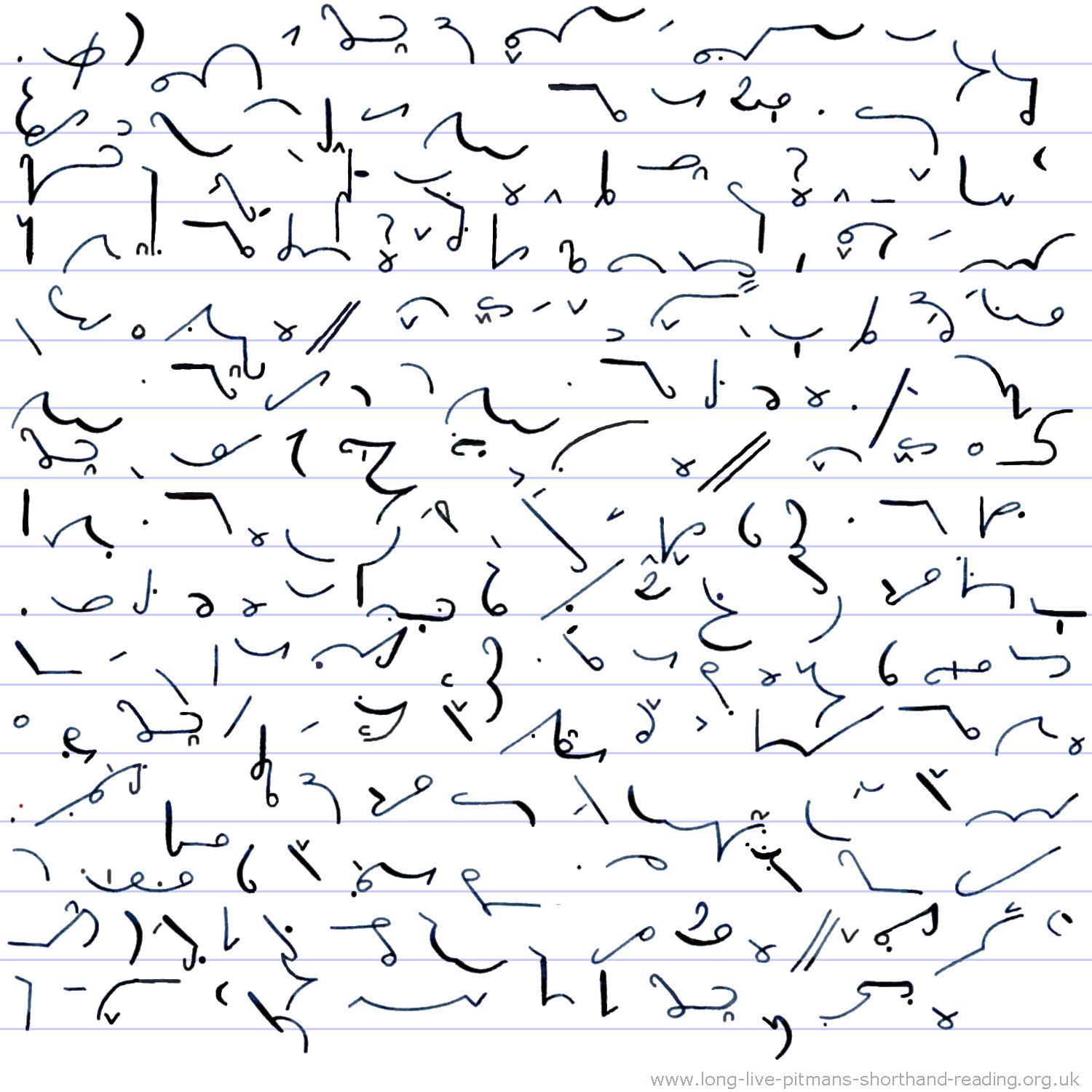
The next charge was similar and the prosecution were smiling and
smirking in full confidence that this one would bring me down: leaving
gaps in the shorthand notes, a clear dereliction of duty and proof of
total incompetence. How does the accused plead? How could I deny that I
had left gaps at some time? I turned towards Mr Pitman, who smiled and
immediately put forward his refutation. "My client and I would like to
know which is the worse offence, leaving a gap of one word or leaving a
gap of ten words." The judge ordered the prosecution to answer, and they
grudgingly agreed to the latter. "My client has occasionally had to
leave a gap. If she had stopped to ponder on the outline, then there
would have been* a gap of at least the next ten words. In mitigation of
this rare shorthand failing, she always attempted to go back and put it
in the margin when there was a pause in the speaking. I feel this course
of action has saved the prosecution much distress and anguish by
reducing the size of the temporary gaps left. The resultant difficulties
were always cleared up eventually, if not by memory or common sense,
then by consulting the speaker, a most commendable practice, where
accuracy was obtained at the painful expense of having to admit one's
shortcomings." I hadn't really thought of it quite like that before, and
neither had the prosecution, to their chagrin.
* Omission phrase "there would (have) been" There is little saving on
writing time between this and using "have" with an N Hook, but the join
is much clearer thus improving legibility.
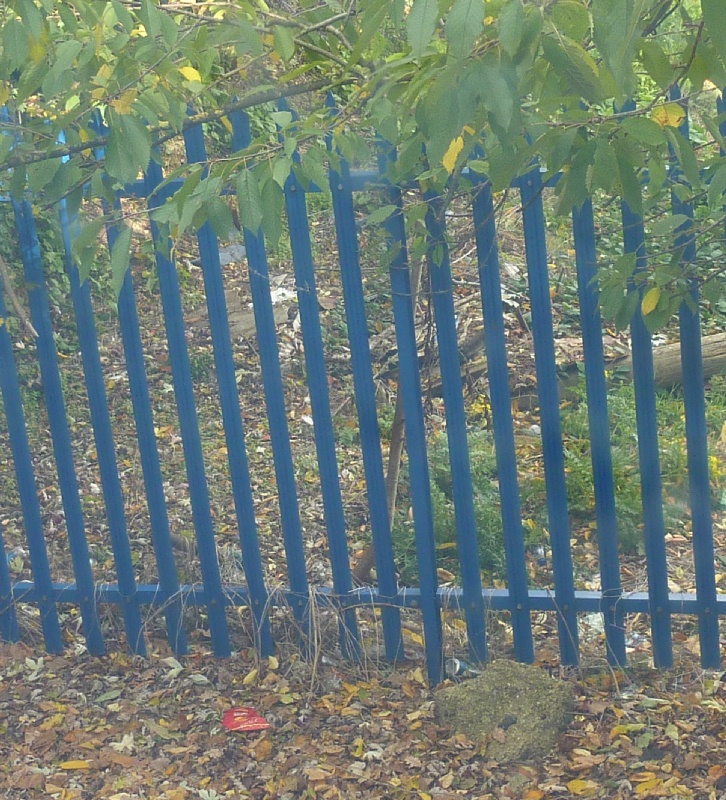
Would my life be a
wasteland behind bars?
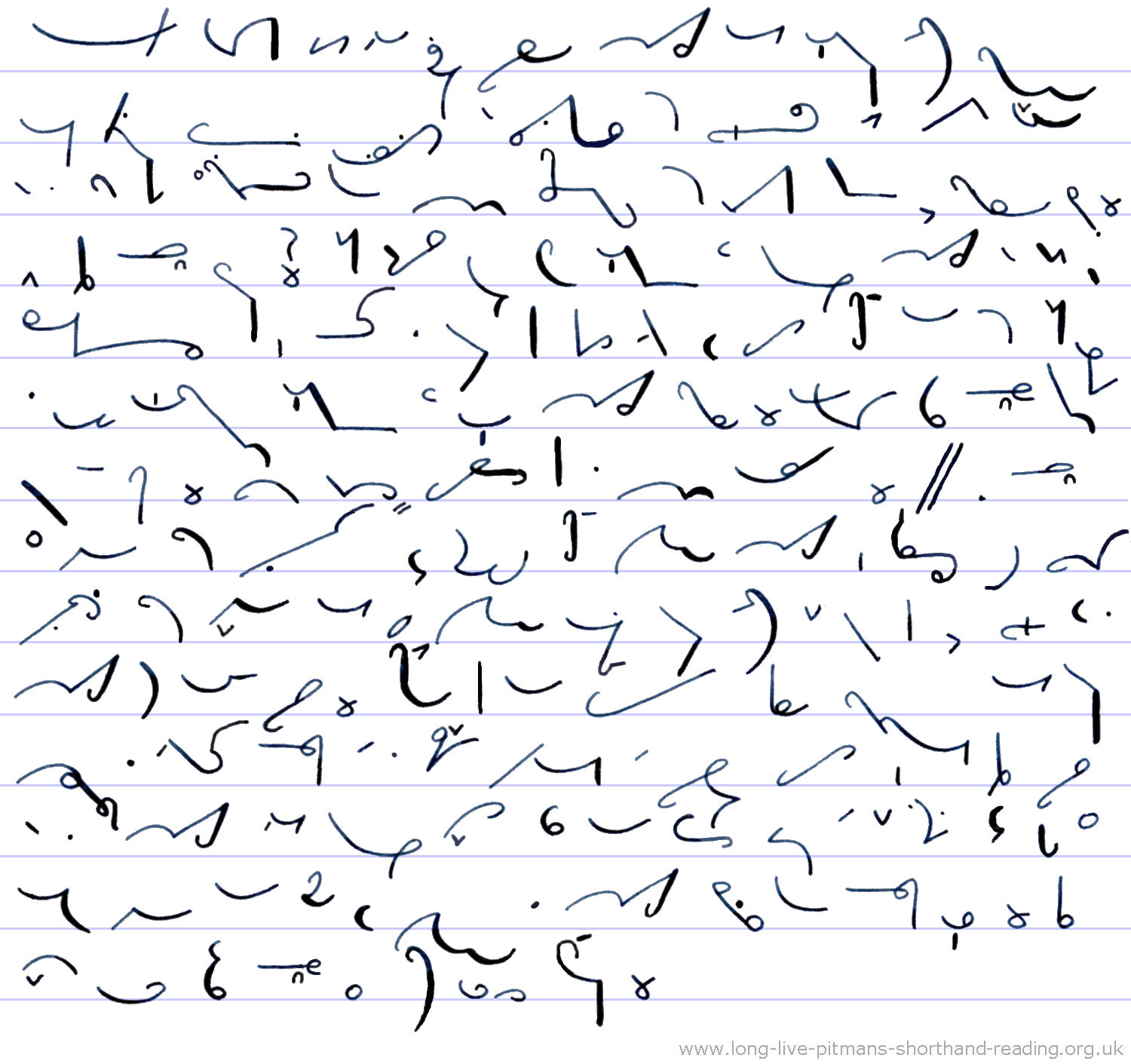
Another charge followed: Not consistently using margins in the notepad
and therefore bringing into jeopardy the quick insertion of headings or
corrections, and the rapid finding of a particular paragraph for
immediate transcription or to read back to the person speaking. How does
the accused plead? I had always filled every notebook with pencil
margins of about two centimetres, but occasionally a page had turned up
without one drawn in, or I had to start a new unprepared notebook with
no margins present. Unfortunately* this accusation appeared to be quite
true. Mr Pitman once again had an immediate answer. "The accused has
written, very rarely, without the essential drawn left hand margin, but
on those occasions* she merely refrained from writing in the first left
hand inch of the page, and therefore I put it to the court that a margin
was in fact used. Drawing it in, where it is not pre-printed in the pad,
must be considered an optional extra, and a highly recommended and
useful one, but it is the use of a margin, not the pencil line, that is
in question* here and I assert that the defendant has never written any
shorthand without leaving a margin space for extra notes. It is my
opinion that this accusation is therefore fundamentally flawed."
* "unfortunately" "question"
Optional contractions
* "occasion" The shun hook is
reversed in this phrase, in order to balance the circle S
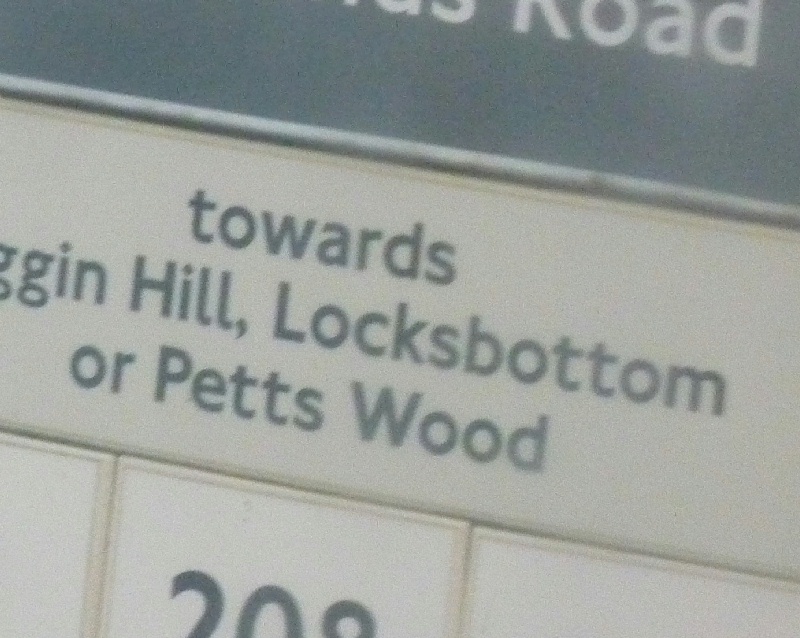
Don't mention locks
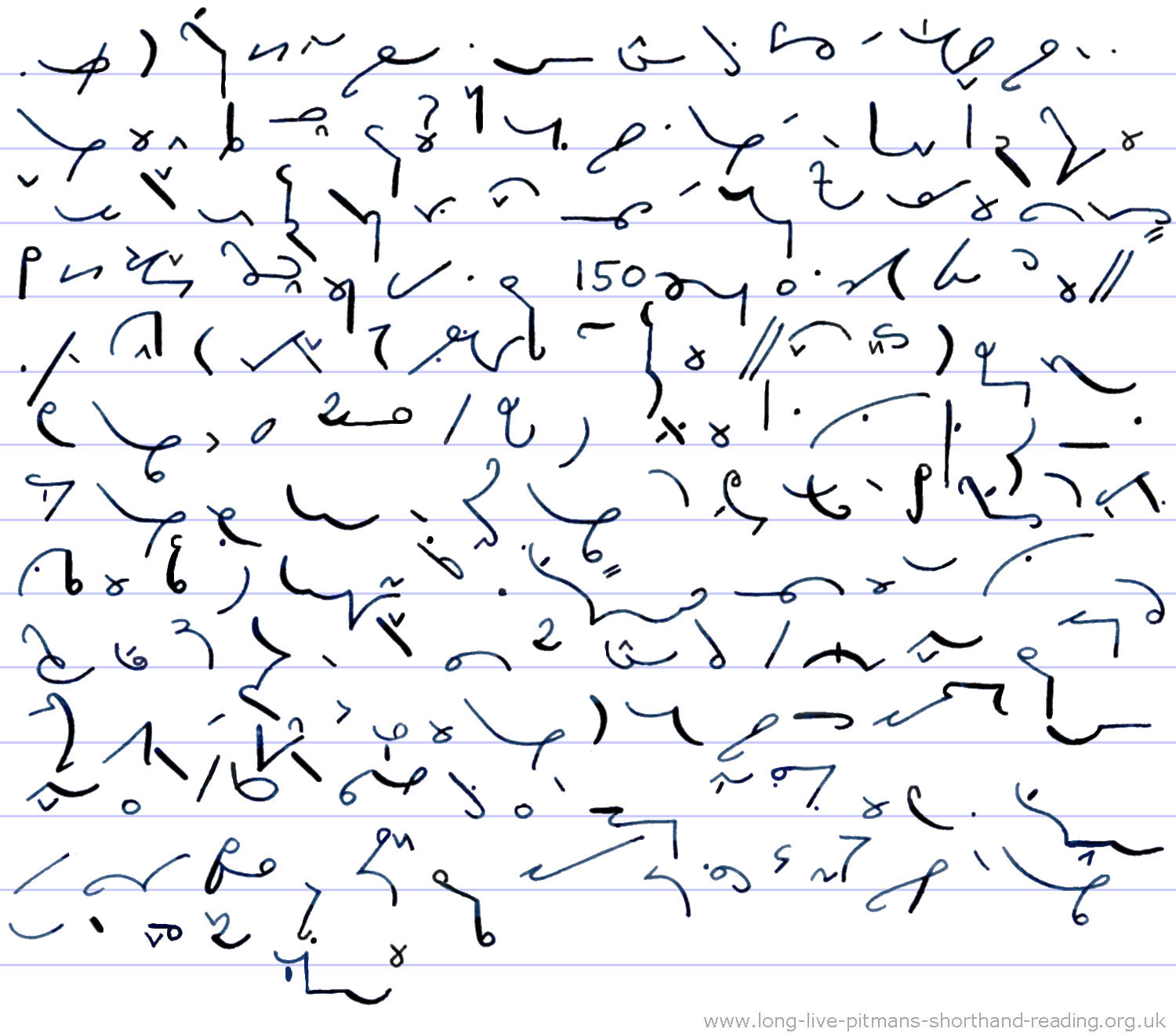
The next charge was brought: not using an ink fountain pen at all times
and unauthorised use of a pencil. How does the accused plead? I had
indeed used a pencil and to deny it would be perjury. I knew by now that
it would be better to let my excellent and indefatigable* attorney
answer. Mr Pitman said, "I would like the prosecution to consider
whether a speed of 150 words a minute* is a worthy achievement or not*."
The judge allowed them to reply and they resentfully agreed that it was.
"My client was instructed to bring several pencils to the first
shorthand class, which instruction she obeyed. At a later date she was
given a clutch pencil to save having to sharpen the pencils or suffer
the inconvenience of sudden broken or wobbly leads. With this she
eventually passed the afore-mentioned exam. In later years personal
funds were available to buy some shorthand fountain pens, which improved
the writing speed and quality, and therefore the readability and
durability of the notes. Pencil was never used again, and we agree that
ink writing is much faster, as long as the pen is of good quality and
not scratchy. However, the foregoing are merely suggestions to achieve
higher speeds, and we are here concerned with the actual usage of
pencils in all kinds of shorthand note taking."
* "indefatigable" Optional contraction
* Omission phrase "words (a)
minute"
* "or not" N Hook and halving for "not"
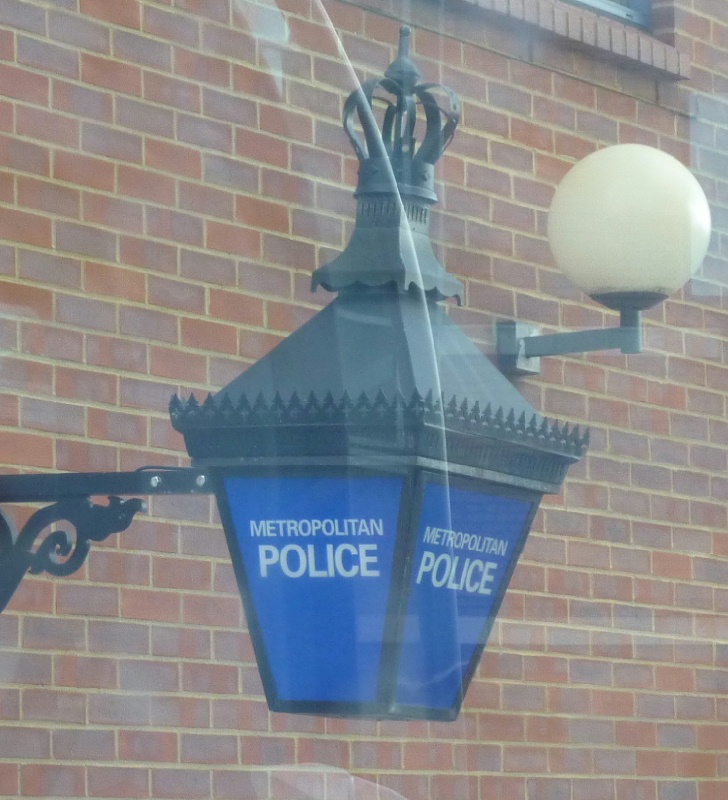
A nice blue for the ink
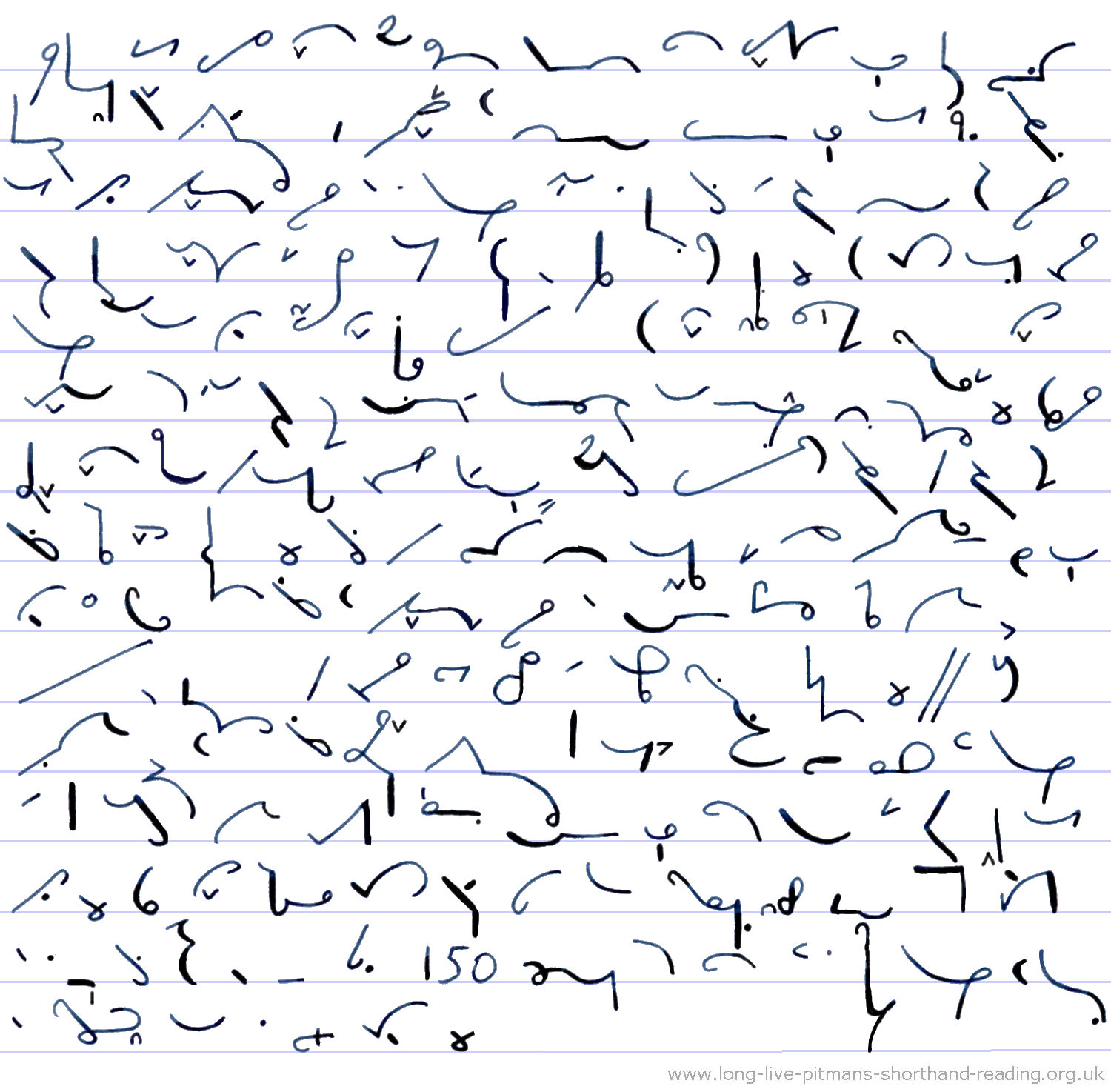
He continued, "Once my shorthand system became more widely known, it was
eagerly taken up by reporters who realised that making quick notes in
the street, possibly in the rain, required the use of a pencil and not a
dip pen, and I believe many of them used both, depending entirely on the
situation in which they had to discharge their duties. They also needed
to use pencil in low light conditions, where they might smudge the
previous line of writing, or not be able to see the inkpot, for example
in council meeting rooms. This was despite my strong recommendation to
use the Fono Shorthand Pen wherever possible, which I believe was the
best of its kind at that time. Pens are greatly improved nowadays, but
the most relevant fact* is that no law has ever been passed that
required the use of ink at all times, and it is left to the writer to
determine which to use, according to the circumstances and necessities
prevailing at the time." I was relieved to hear that past high-speed
reporters had enjoyed great success with pencil, and had not been left
to read soggy ink notes from being on the job out in the rain. This line
of defence also boded* well for present-day students who could not get
hold of a good pen, and that they too could achieve 150 words a minute*
or more with a traditional pencil, without fear of prosecution in a
court of law.
* Omission phrase "relevant (f)act"
* "boded" Note "bode", past tense "boded", means to portend or be an omen
of, derived from a word meaning announce. Compare "bide", past tense "bode",
meaning to endure, stay, remain or abide.
* Omission phrase "words (a)
minute"
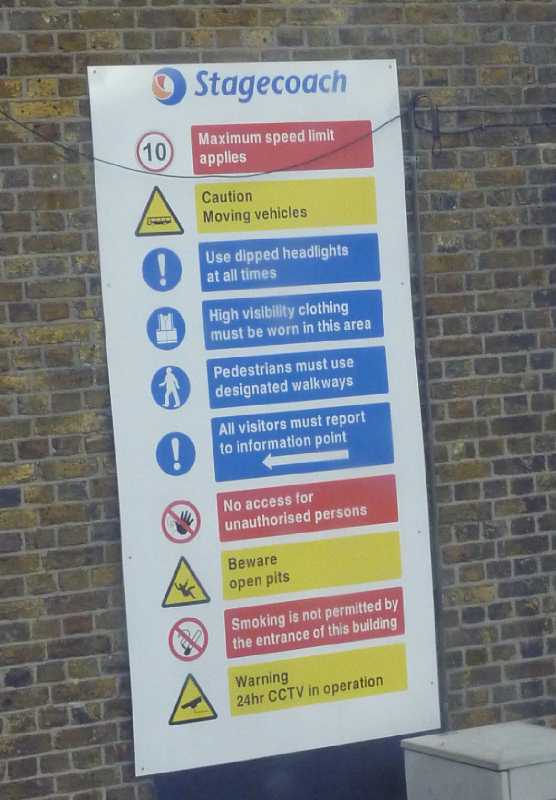
Which rule
had I broken?
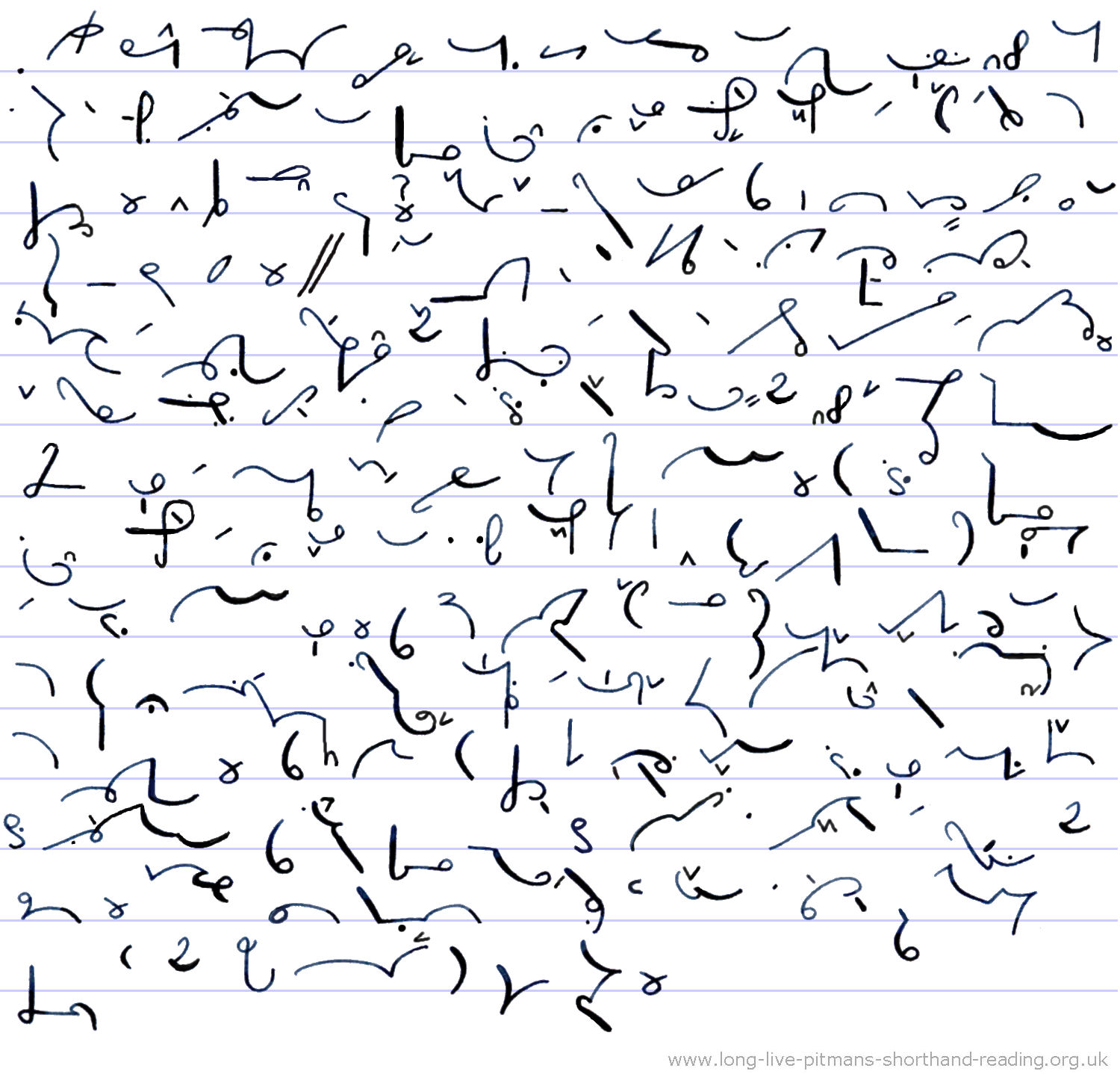
The last charge sounded extremely serious indeed: negligence in leading
innocent students onto a path of study resulting in difficulties,
confusion, late nights, exhaustion, anxiety and either obsession or
disillusionment. How does the accused plead? I felt I could probably
answer this but Mr Pitman raised his hand, so that he could speak first.
"Not guilty to all charges of alleged misconduct, malicious, harmful and
misleading procedures of shorthand dissemination, and abandonment* of
responsibility to writers and learners. I present Exhibit One, a list of
complaints by non-shorthand students on the exigencies of taking their* journalistic notes and minutes of meetings using only traditional
longhand. They complained of difficulties, confusion, exhaustion and
late nights in a state of anxiety at how they would read back their
scrawled and incomplete longhand notes. These were illegible either
because there was no time to write the words in full, or they had made
impromptu* abbreviations, untested and untried, which were later found
to be ambiguous or misleading. This left them disillusioned at the
impossibility of writing complete notes, and indeed the time spent
resolving these avoidable difficulties could have been spent learning a
reliable and proven shorthand system. I am glad to say that* some became
obsessed with finding a solution to this and fortunately discovered that
shorthand instruction material was easily available."
* "abando(n)ment" The contraction omits the N
* "taking their" Doubling for "their"
* "impromptu" Wors with "-mpt-" generally omit the lightly sounded P
* Omission phrase "I am glad (to) s(ay) that"
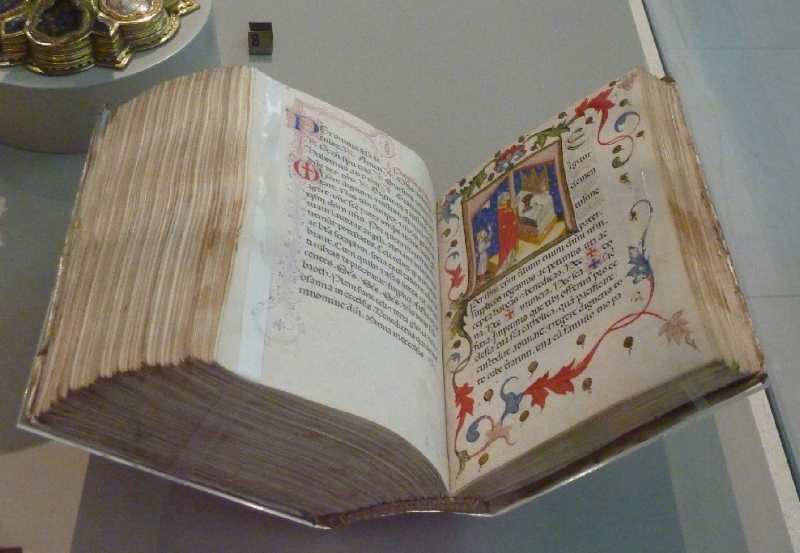
Manuscript song book, Victoria & Albert Museum, London
Slow, laborious and
paper-consuming longhand
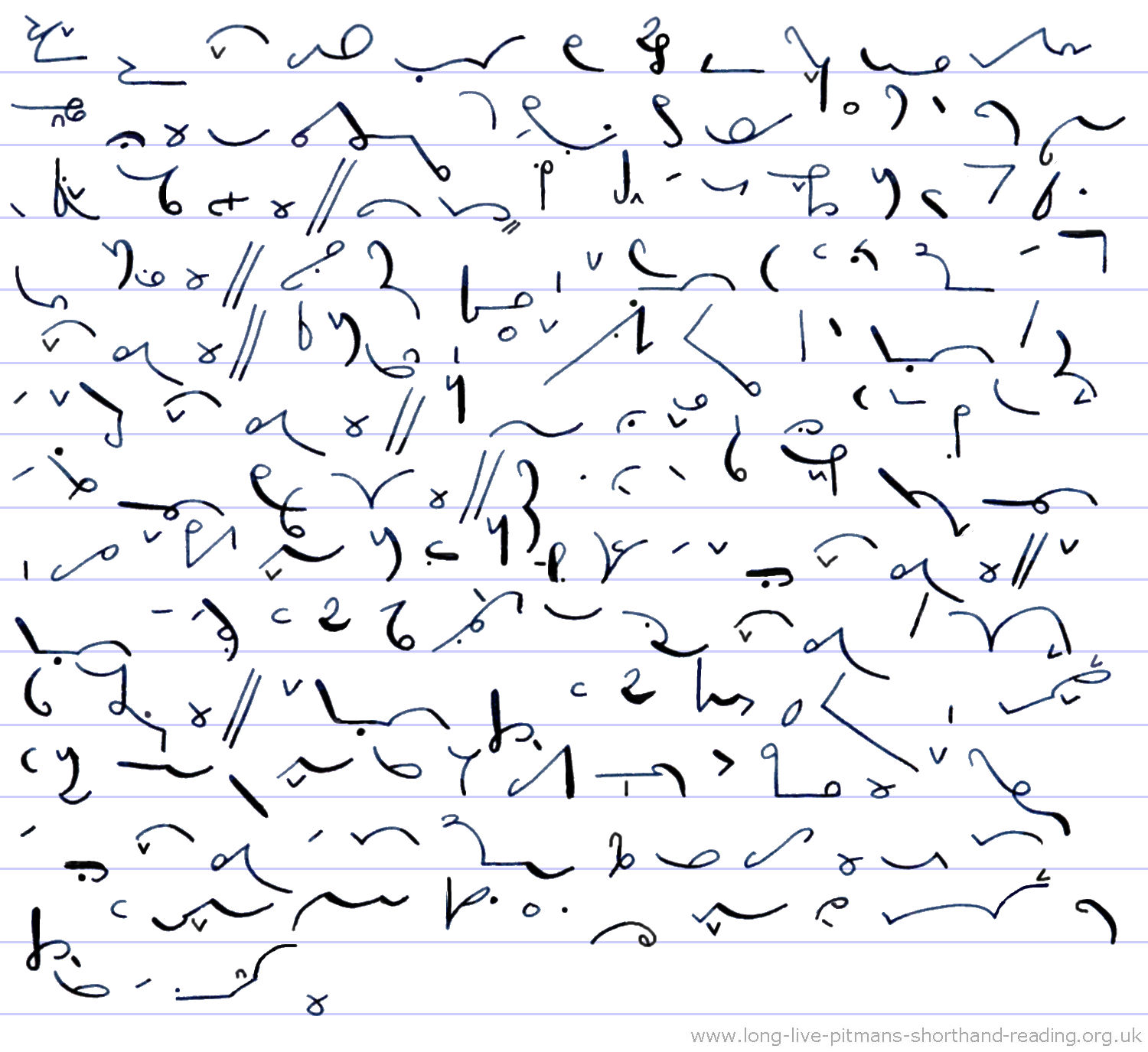
"I would like to call my witnesses, namely several shorthand students* who can provide evidence to refute the accusations made. No habeas
corpus or subpoena has been necessary, as they are all very willing to
testify in this court." Mr Pitman sat down and in the excitement I was
able to catch just a few of their comments. "Yes, there were
difficulties, but I overcame them with hard work and got my
certificate." "At first I was confused, but as I re-read the chapters,
it all became much easier and I obtained my certificate." "I had many
late nights but this meant that I could sit for and pass the exam
several months early." "There was a lot of anxiety before the exam, but
once I started writing, I was glad I had studied so well, and I gained
my certificate." "I became quite obsessed with shorthand, and this
resulted in earning my certificate much earlier than anticipated." "I
became disillusioned with shorthand at the end of the first chapter, but
I realised that I was not going to be writing fast until we had covered
all the strokes. I persevered and gained my certificate, and I am
working towards the next one. Now I am disillusioned with handwritten
longhand, at least as a means of writing lots* of material very fast and
accurately."
* Omission phrase "shorthand s(t)udents"
* "lots" "masses" Always insert the
vowel, as these are similar in outline and meaning
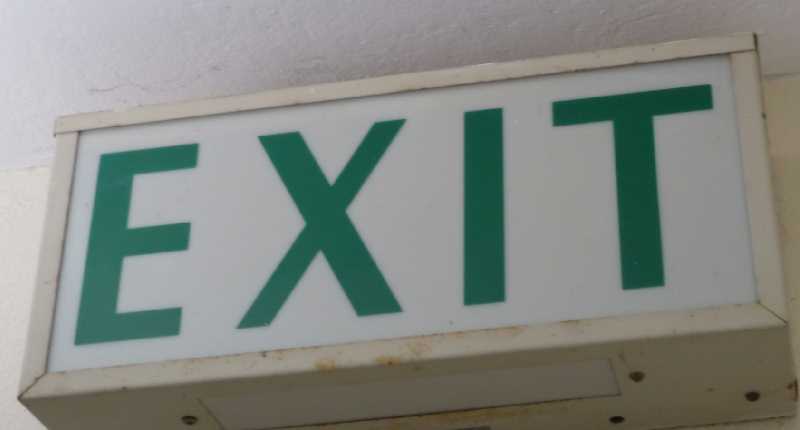
Yes please!
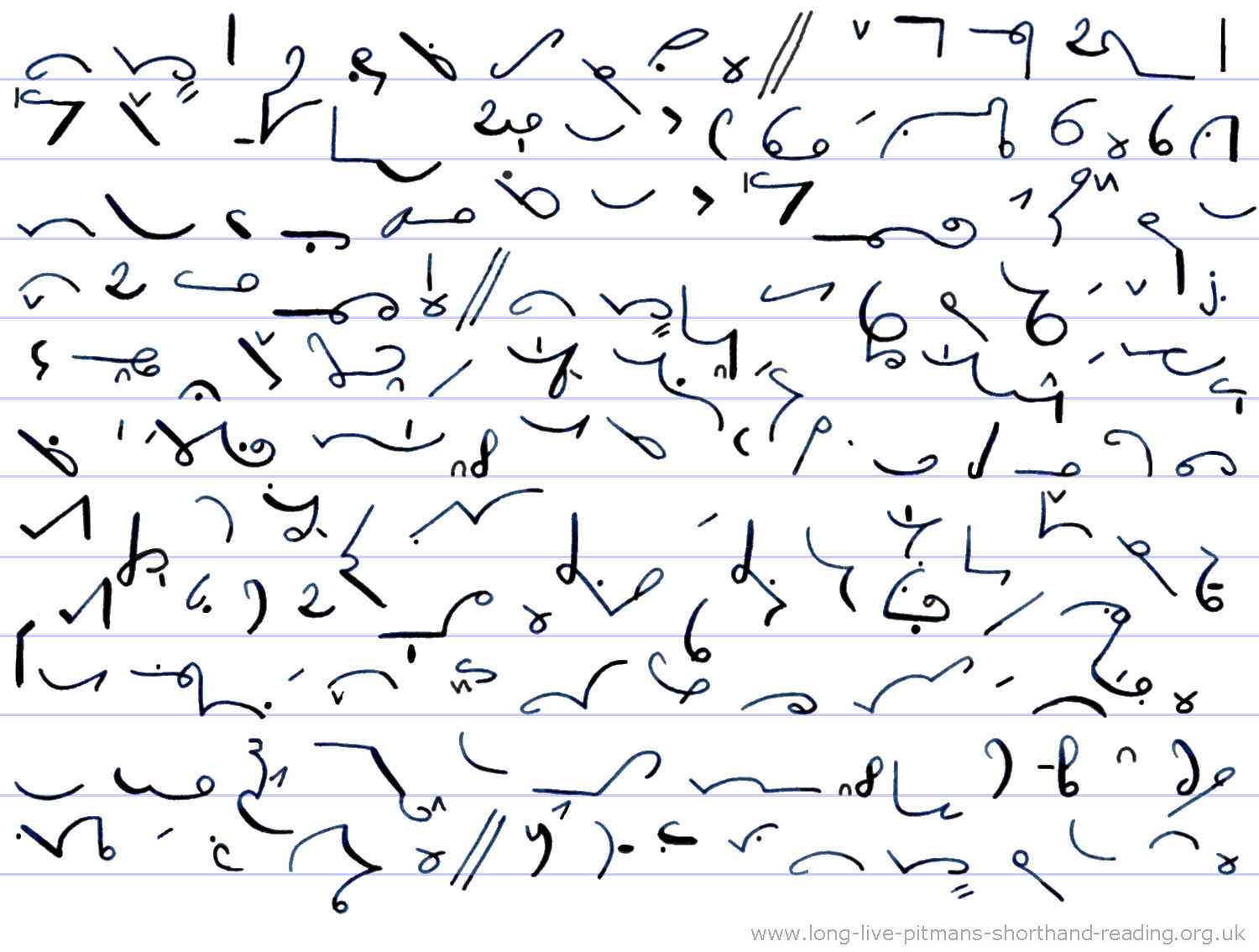
Mr Pitman had shrewdly saved the best one to speak last. "I got extra
shorthand practise at college by taking shorthand notes in all the other
lessons and lectures as well. This led to me being able to gain first
class passes in all the college examinations, and the highest speed in
my shorthand class exams!" Mr Pitman continued, "These statements* speak
for themselves and I contend that the accusations made by the
prosecution are unjust, unfair and completely unfounded, and I can only*
conclude, based on observations of my own students in the past, that
such an opinion generally comes from someone already disillusioned or
anxious, which would be rapidly dispersed and dispelled if they only
took the time to speak to those who had already achieved their shorthand
goals. These allegations are mischievous in the extreme and my client
merely offers the means to learn and improve. No evidence whatsoever can
be found for coercion to make students continue their studies beyond
their own requirements, abilities and comfort levels." I was so glad I
let Mr Pitman speak for me.
* "statements" written differently in order to join. The Ses circle
represents the S sound of each word
* "I can only" On its own, "only"
is written with full N and L strokes

Bars opened and
freedom in sight
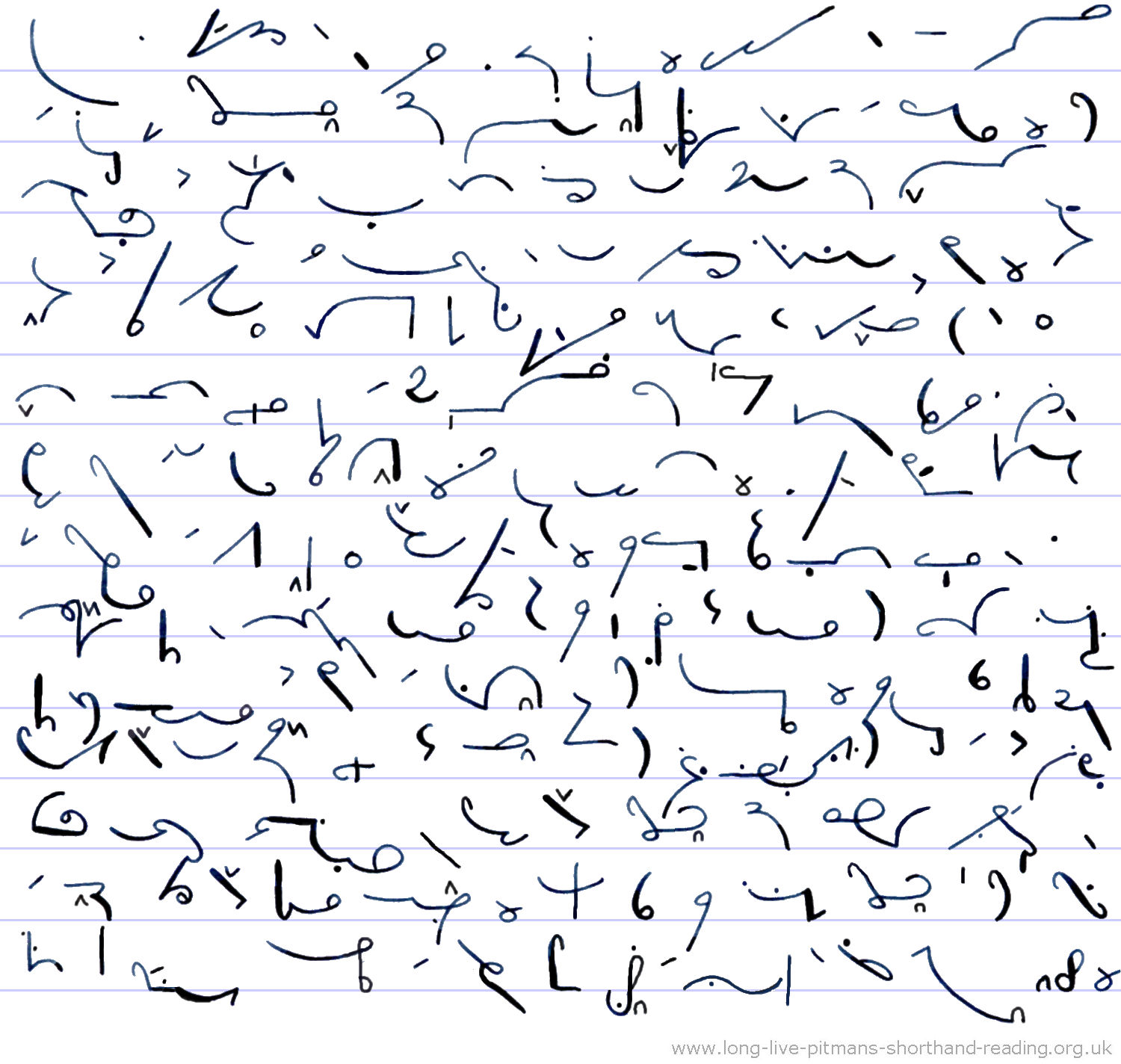
After an adjournment of two hours, the hearing continued. We were all
quite relaxed and confident, but the prosecutors were looking decidedly
pale and nervous. Their implications of the unlawful nature of my
actions in shorthand writing* were likely to fall foul of the judge's
ruling and his interpretation of any regulations appertaining* to the
subject. As I looked at the jurors, I felt that I recognised them all,
as my commercial course teachers and shorthand colleagues from college,
but maybe this was an illusion as they would probably not have been
allowed to serve if they knew me. The judge spoke at length on the
proceedings and read out his final judgement. He concluded that this
came close to a mis-trial due to improper evidence, although he did
concede that the evidence was merely inadequate due to their ignorance
of the subject and failure to check their facts. He was confident that
his decision would not be overruled by any higher court, that the
accused was completely exonerated, and all the ill-conceived
allegations, infringements and grievances put forward by the prosecution
were successfully responded to and countered by the defence counsel.
Notwithstanding this, he commended the prosecution on their brave
attempt at protecting the interests and possible delicate constitution
and mentality of past and future students.
* Omission phrase "short(hand) writing"
* "appertaining" Keep well above the line and insert the first vowel,
so it is not misread as "pertaining" which has the same meaning
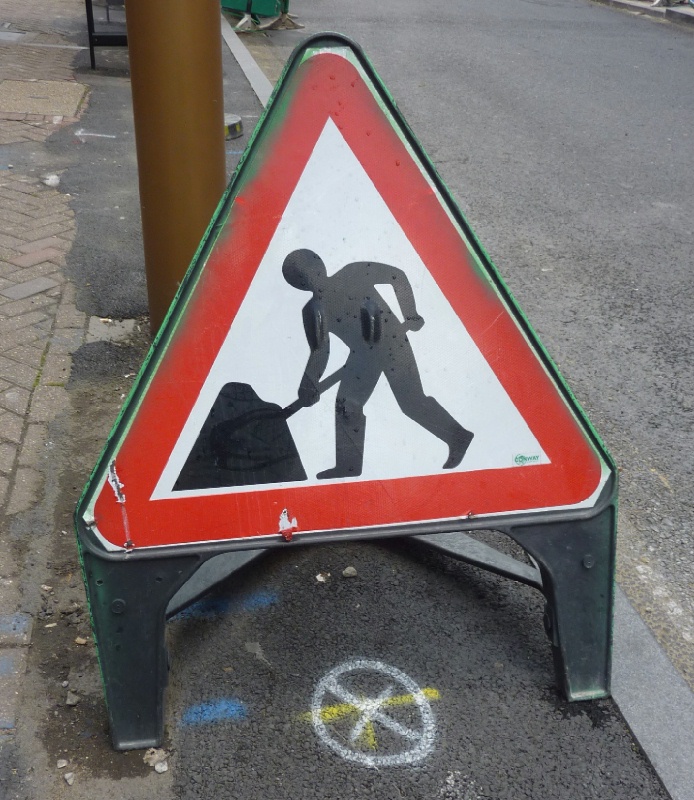
Prosecutors had dug
themselves into a hole
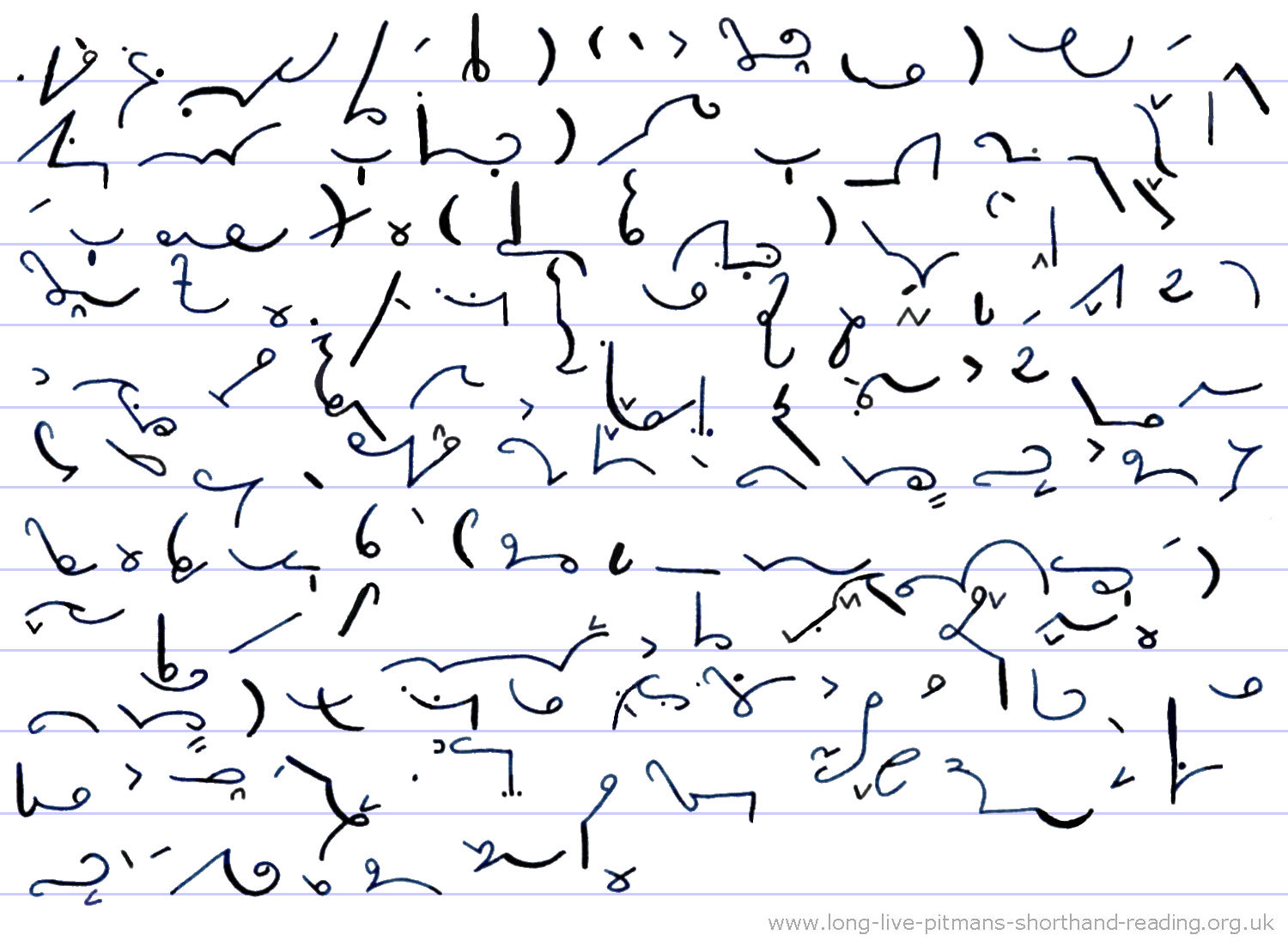
The jury's completely impartial* judgement and decision was that all of
the prosecution's evidence was insufficient and should be rejected
immediately, no condemnation was relevant, no guilty verdict could be
arrived at, and no sentencing was required. They declared that this
litigation was poorly thought out by the prosecuting attorney. The judge
commented that it was not in his jurisdiction to suggest how the
defendant should write shorthand or what implements to use, and that
this would be left to the advisory committee, who would be consulting
all the shorthand books written over the past nearly two centuries, from
the time of Mr Pitman's creation of the system until the present. This
would include those of other systems, who have come to many similar
conclusions, and whose minor differences of opinion are largely
immaterial to the attainment of reliable high speed writing. Mr Pitman
was nevertheless commended for his eloquent appraisal of the situation
and his attention to detail in his defence of the accused, obviously a
quality he had perfected whilst working on the creation of and revisions
to his system of shorthand writing.*
* Shel always goes up, and Sher always goes down
* Omission phrase "short(hand)
writing"
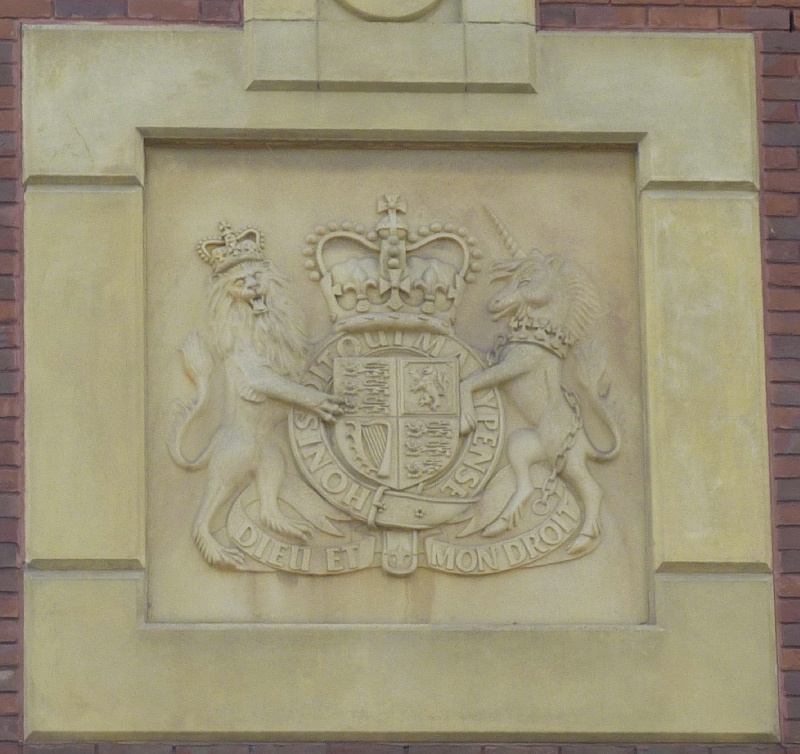
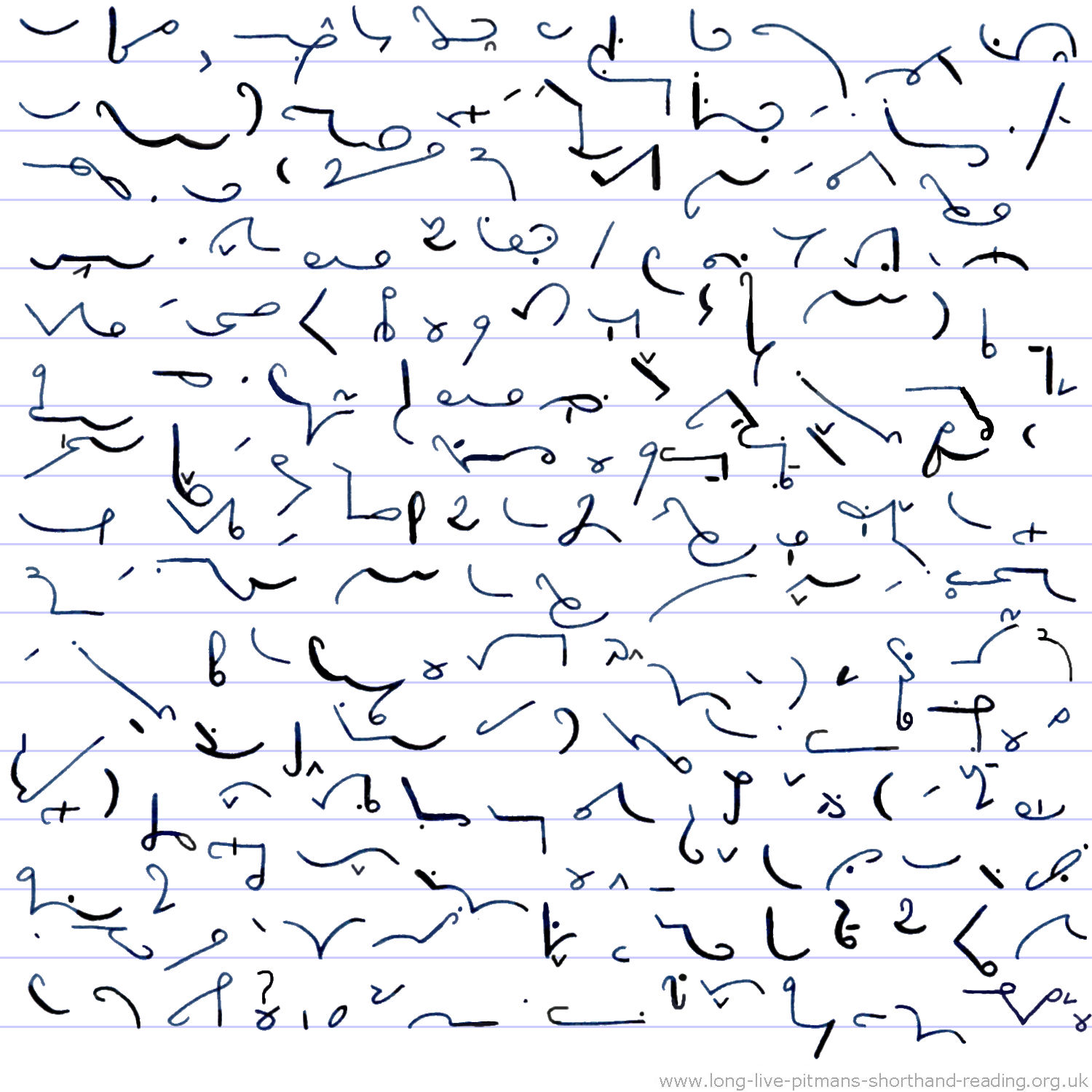
In deference to the counsel for the prosecution, in order to* deflect
attention from their miserable failure in bringing their grievances to
court and obtaining condemnation and a conviction, the judge expressed
the opinion that shorthand writers* were already willing and happy
prisoners, undergoing a life sentence of shorthand fascination, which
however seemed only to lead to improved performance and increased job
satisfaction. He also noted that the traditional longhand was itself
struggling against a virtual death sentence imposed by the ubiquitous
computer keyboards, audio recording devices and speech to text programs.
He concluded by suggesting that interested parties should study
shorthand for journalism and personal notes, stenotyping for court work
and captioning, longhand for personal letter writing and calligraphy,
and computer studies for everything else. I looked around the room to
see who the plaintiffs actually were, but they were all bending down
packing away their papers for a quick exit. As the court was dismissed,
my eyelids began to get heavy, but then all of a sudden* I opened them
and I saw the sun streaming through the curtains in my bedroom. How
could I have lain in bed wasting a couple of hours of early morning
daylight when I could have been doing all those shorthand jobs left over
from yesterday? But first I would make a quick draft of my strange court
room experience. (3367 words)
* Omission phrases "in ord(er to)" "short(hand)
writers" "all (of a) sudden"

Additional vocabulary, with contractions in
capitals:
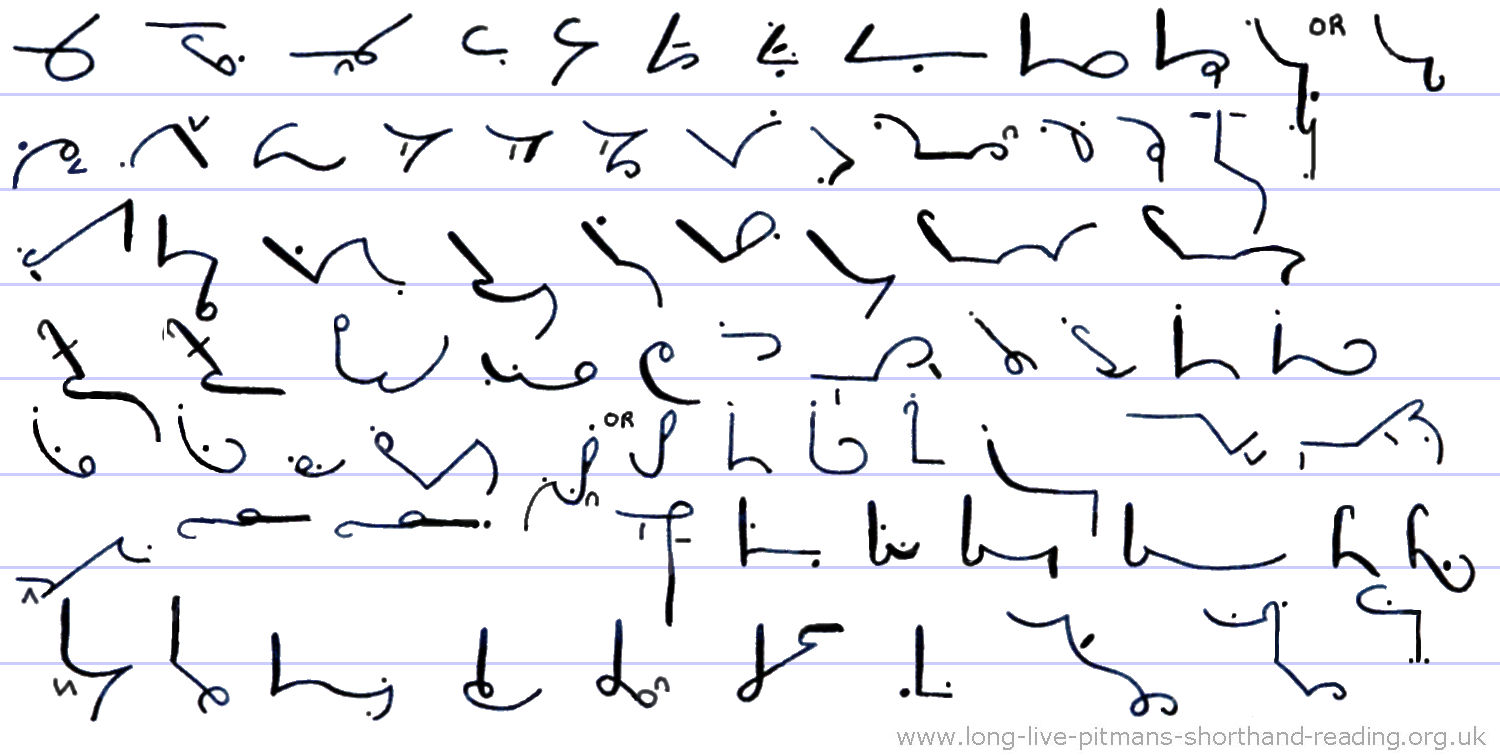
1. accessory, accomplice, accuser, acquit, acquittal, adjourned,
adjudicate, adjudicator, administer, administered*, AFFIDAVIT
2. alias, alibi, alimony, annul, annulled, annulment, appeal, appealed,
argument, arrest, arrested, autopsy
3. award damages, bailiff, BANKRUPTCY, bar, barrister, bench, blackmail,
blackmailed
4. burglar, burgle, CIRCUMSTANTIAL evidence, civil action, collusion,
compensation, complainant, condemn, condemnation
5. confess, confession, consent, conspiracy, CONSTITUTIONAL, contempt,
contention, contract, convict, copyright, coroner
6.
counterfeit, cross-EXAMINE/CROSS-EXAMINED/CROSS-EXAMINATION,
CROSS-EXAMINING, custody, decree, defend, defended, defender,
deliberate, deliberation
7. denial, deposition, diminished, dishonour, disputes, disregard,
edict, enforcement, entrapment, equity
* "administered" Omits the R
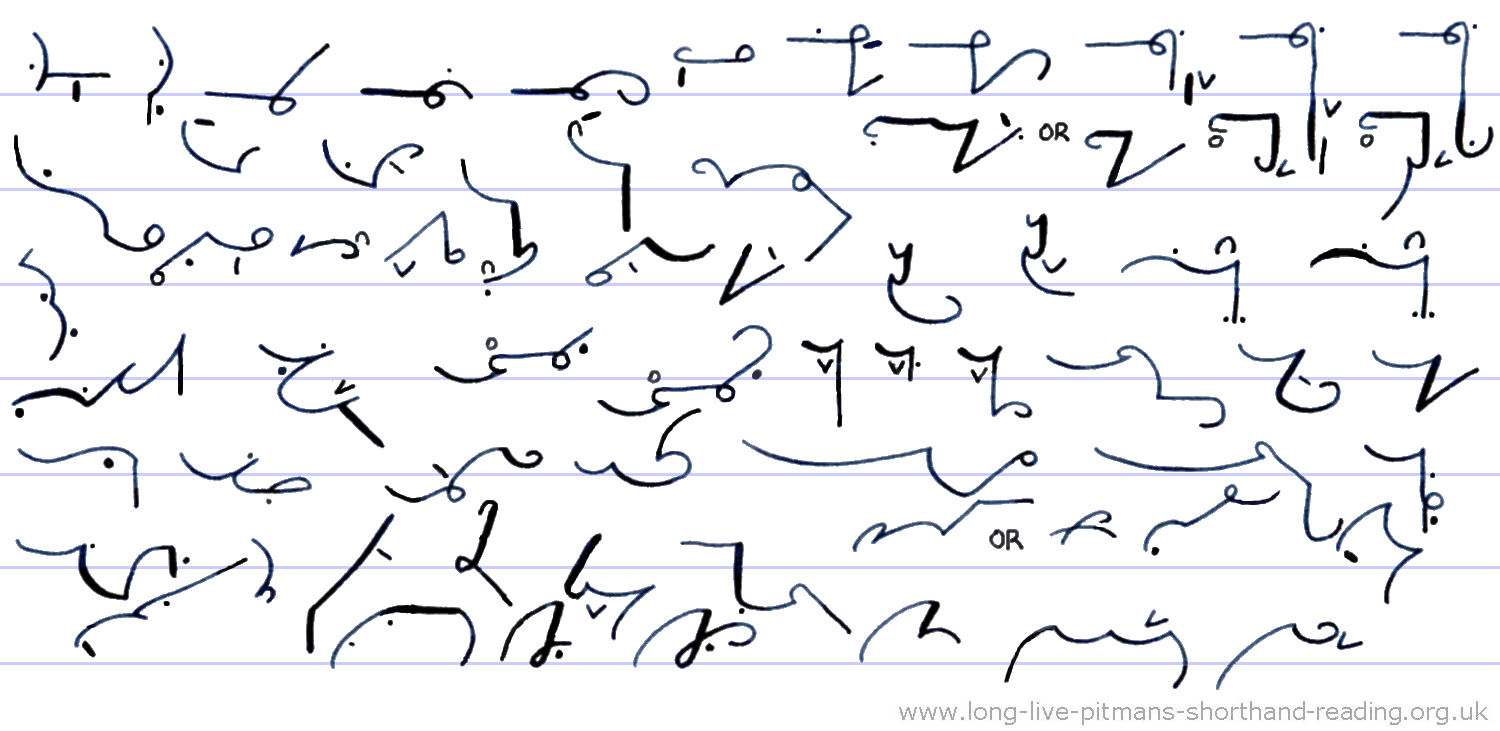
1. escrow, estate, EXECUTOR, exempt, exemption clause, extort,
extortion, extradite, extradited, extradition
2. fairness, fault, felon, fiduciary, fraud, freedom (of) speech,
GRAND-JURY, guardian, guardianship
3. hearsay, heinous, human rights, hung jury, IDENTIFICATION, identify,
immunity, impunity
4. impartiality, inalienable, incarcerate, incarceration, indict,
indicted, indictment, infraction, injunction, injury
5. inmate, inquest, insolvent, intentional, interference,
interpretation, intestate
6. invalidate, issue, judged, JURISPRUDENCE, juvenile, kidnapper,
landmark*, larceny, lawful
7. lawyer, legacy, legislate, legislation, legitimate, leniency, lenient
* "landmark" This is the dictionary optional version, but the M is unclear going
through a halved stroke, and might be better written close up
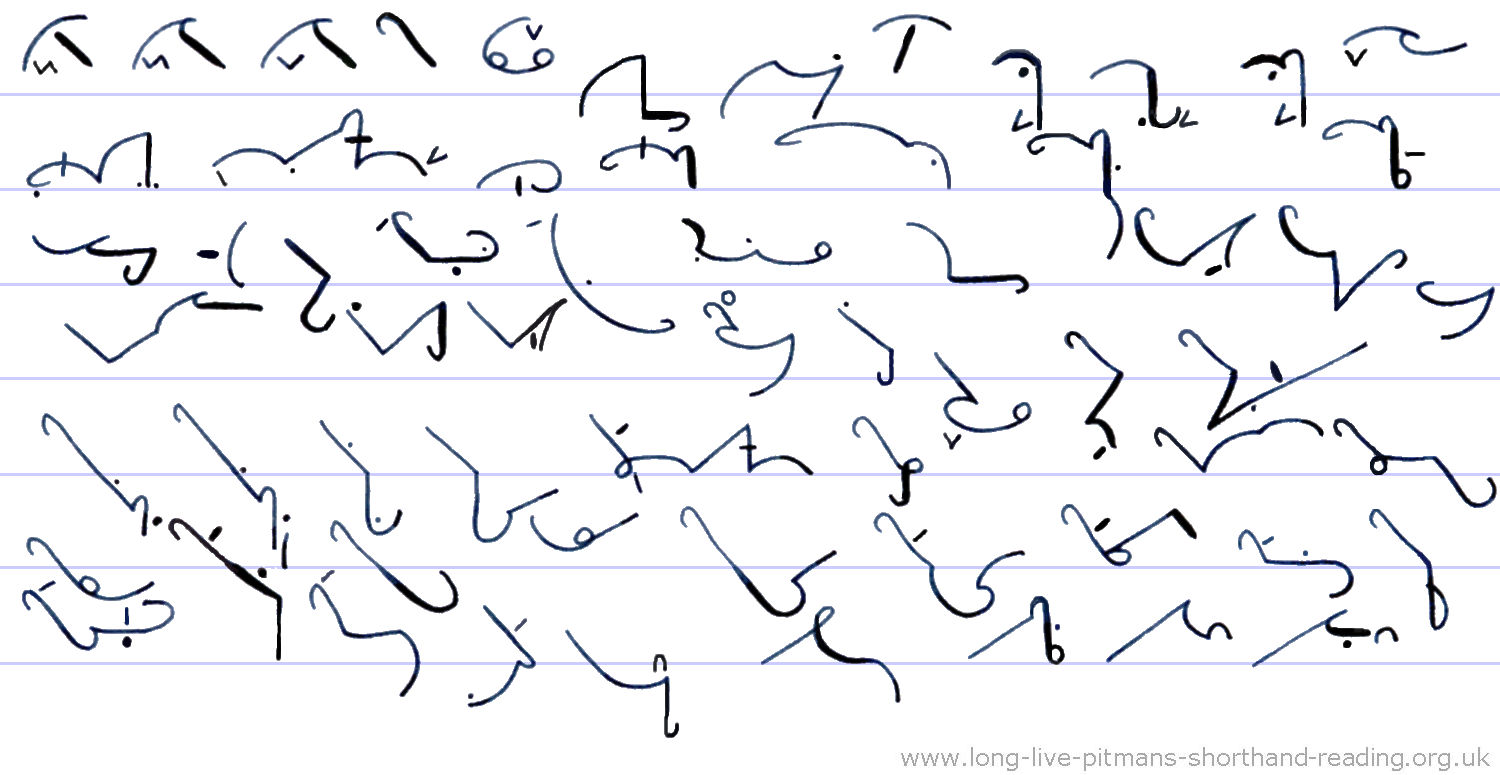
1. liability, liable, libel, LIBERTY, license, litigant, lynch,
majority, mediate, mediation, mediator, minor
2. morality, moratorium, motion, murdered, murderer, murderess,
murderous
3. negligent, oath, OBJECTION, obligation, offender, ordinance,
ORGANISE, overrule, overturn, OWNERSHIP
4. paralegal, pardon, parole, partnership, patent, penalise, perjured,
perjurer
5. perpetrate, perpetrated, petition, petitioner, post mortem,
precedent, PRELIMINARY*, prescription
6. prison, probate, probation officer, probationer, professional,
prohibit, protection, protest
7. provocation, proxy, punish, punitive, receiver, redress, refute,
regulate
* The colloquial word "prelim" is written through the line, which
differentiates it from this contraction, although it would be prudent to
insert vowel signs as well.
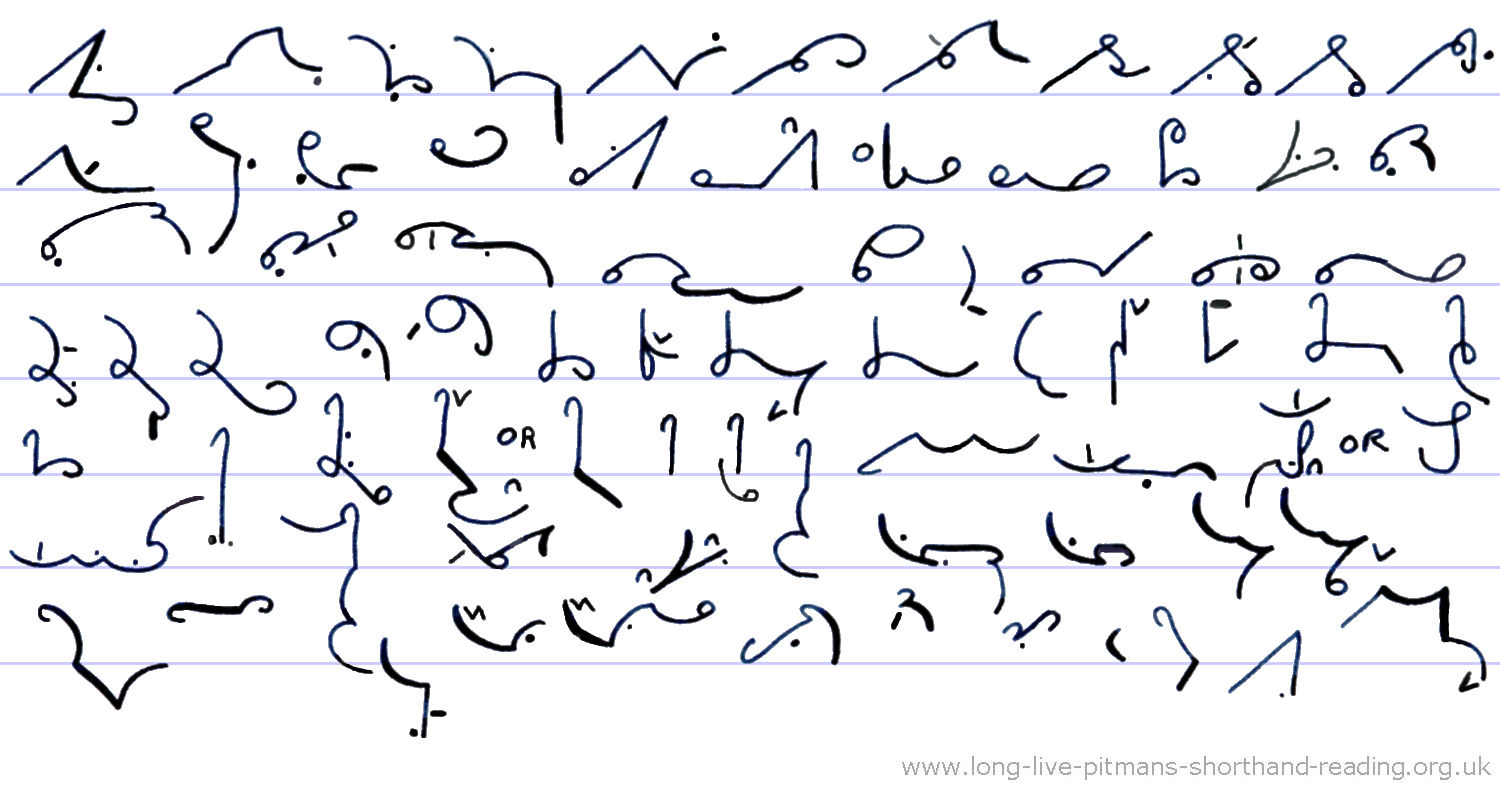
1. rejection, relief, remand, remedy, repeal, resolution, resolve,
respondent, response*, RESPONSIBLE/RESPONSIBILITY*, restraint/restrained
2. revoke, sabotage, safeguard, sanction*, search, security,
self-defence, sentenced, settlement, sheriff, slandered
3. slanderer, slanderous, smuggler, smuggling, solicitor*, sue, summary,
summons, summonsed
4. suspend, suspended, suspension, swear, sworn, testament, testified,
testimonial, testimony, theft, title, tort, transcript, transfer
5. treatment, treaty, trespass, TRIBUNAL, TRUTH, TRUTHFULNESS, truthful,
UNANIMOUS, unclaimed, UNCONSTITUTIONAL
6. unintentional, untruthful, uphold, usury, vagrancy, vagrant, vandal,
vandalise
7. verbal agreement, veto, violate, violence, waiver, ward, warrant,
WITHOUT PREJUDICE, writ, wrongdoer
* "response" Only the vowel signs differentiate this from
the short form "responsibility"
* "responsibility" It would be acceptable to write "responsibility" with a disjoined B
for "-bility" if felt necessary, to differentiate it from "response"
* "sanction" omits the K sound, as do others like this e.g. function,
distinction, extinction
* "solicitor" stretches the Ster Loop rule in order to gain a convenient
outline
Top of page
End Of Month Report (31 October
2014)
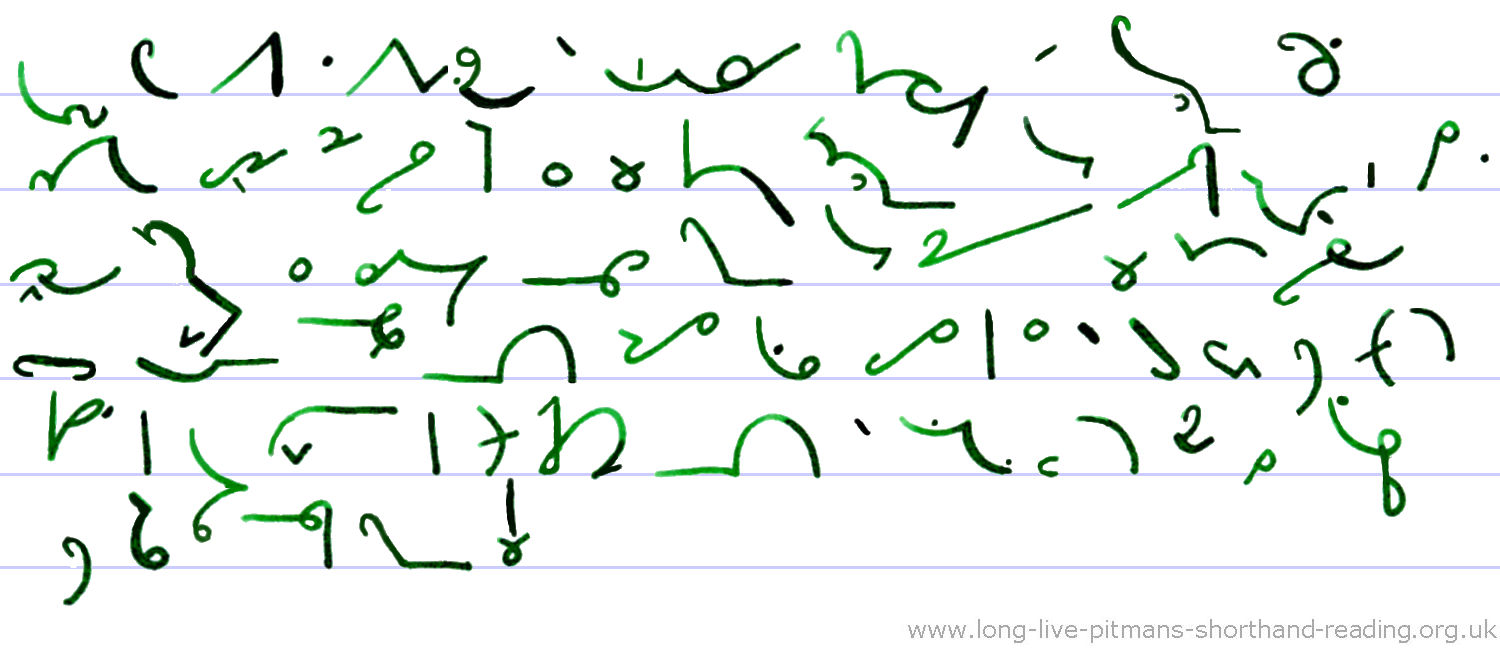
If you have ever read a report consisting of unnecessary terminology and
overworked phrases, you will have wondered what the use of it is. It may
be hard work for the reader to follow, but such a mountain of verbiage
is certainly excellent practice for the shorthand writer*. I am using
green ink because that is the colour of one's face once it has all been
ploughed through (or at least* it feels like it) and it is also the
colour of envy, when your shorthand is the fastest through all this
extra practice!
* Omission phrase "short(hand) writer"
* "at least" "at last" Always insert the vowel
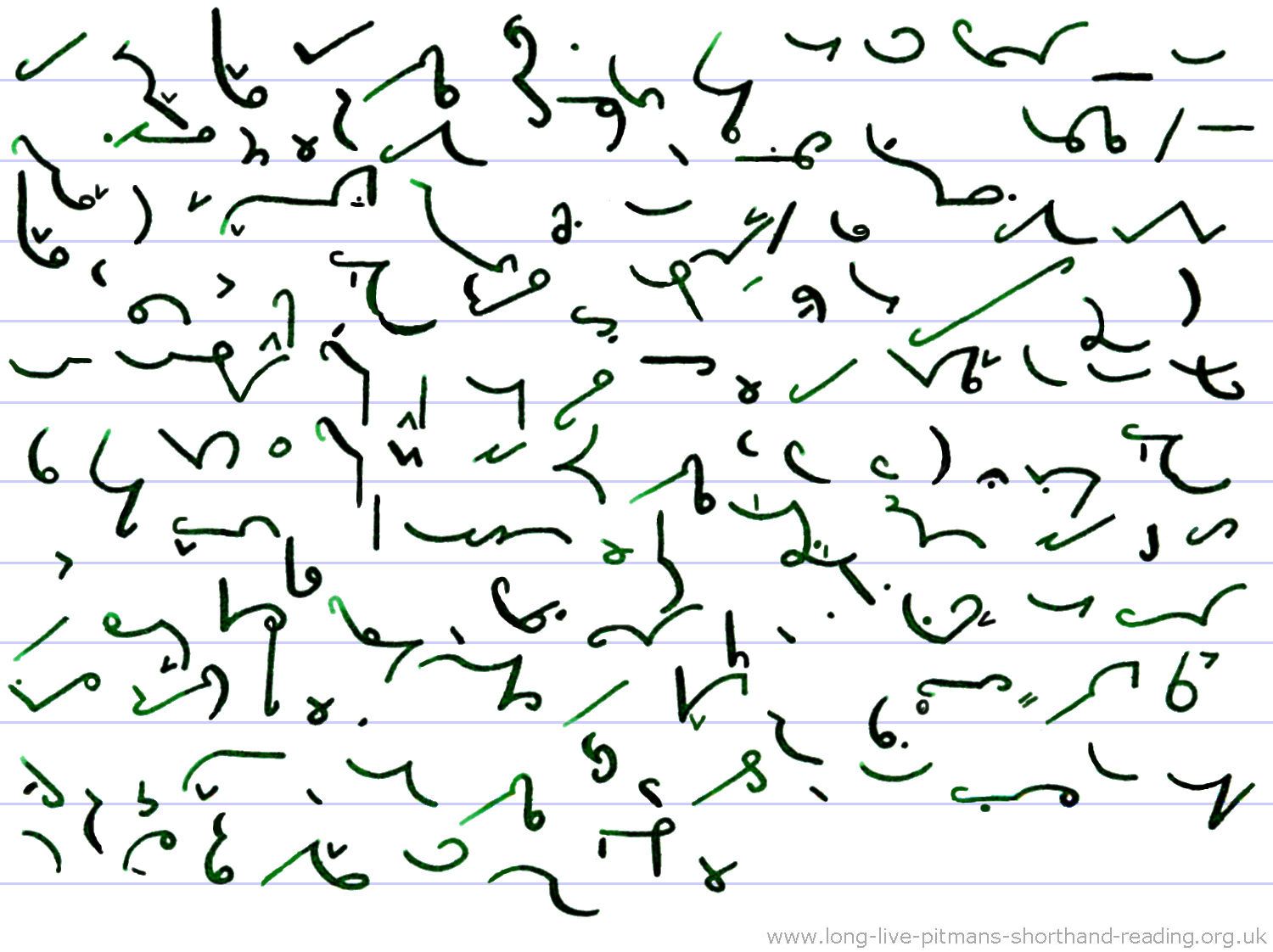
We hereby advise all our readers that there have been* a few changes in
the information formerly given in previous articles issued. Although we
have access to excellent forecasting facilities which can advise us on
the likelihood of future trends in meteorological events, we have to
report that some of the outer clothing that was cleaned, inspected and
stored for the winter season was in fact unexpectedly brought out into
use again. We apologise for any inconvenience this change of policy has
brought about, and would assure readers that every effort was made to
match clothing to the climate conditions at any one time*. It was
unseasonably warm and we did not want our senior administrative*
personnel to overheat merely due to a variation in the normal patterns
of weather. The management are delighted to have these garment-related
choices open to them, but would like to inform readers that they are not
able to respond to any claims for injury or loss that this revised
information may have caused.*
* Omission phrase "there (have) been" in order to gain a good join
* "any one time" Halving for the T of "time"
* "administrative" Omits the R
* "caused" Special outline to differentiate it from "cost"
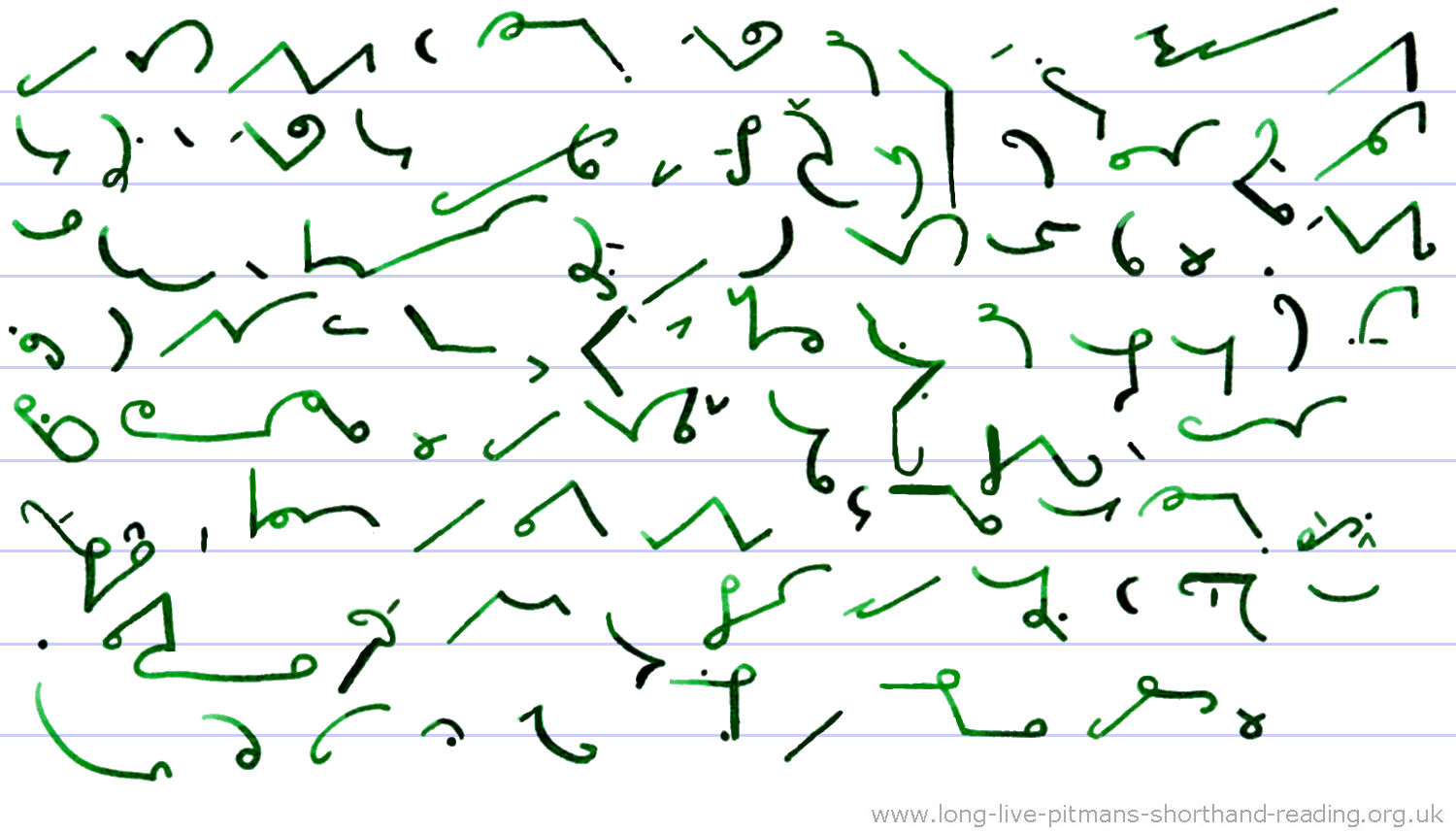
We also reported that landscaping operations were up to date* and
completed, and that we were ready for the cessation of operations for
the winter months, but the sudden arrival of three very small shrubs
resulted in us having to temporarily suspend our usual policy in regard
to* this. The operative concerned was rapidly called back to the job and
the items of vegetation were installed into their allotted spaces as
quickly as possible. We apologise for this disruption to normal
procedures but at the same time are happy to report that the gaps in the
landscaping surrounding the headquarters* frontage*
are now filled satisfactorily, and we anticipate that growth in future
years will meet and even exceed our expectations*
once again.*
* Omission phrases "up (to) date" "in regard (to)"
* "headqua(r)ters" Alternative outline that omits the R
* "frontage" Note that "front edge" would not be phrased but have separate outlines,
as the meaning is almost identical
* "expectations" Optional
contraction
* Omission phrase "wu(n)s again"
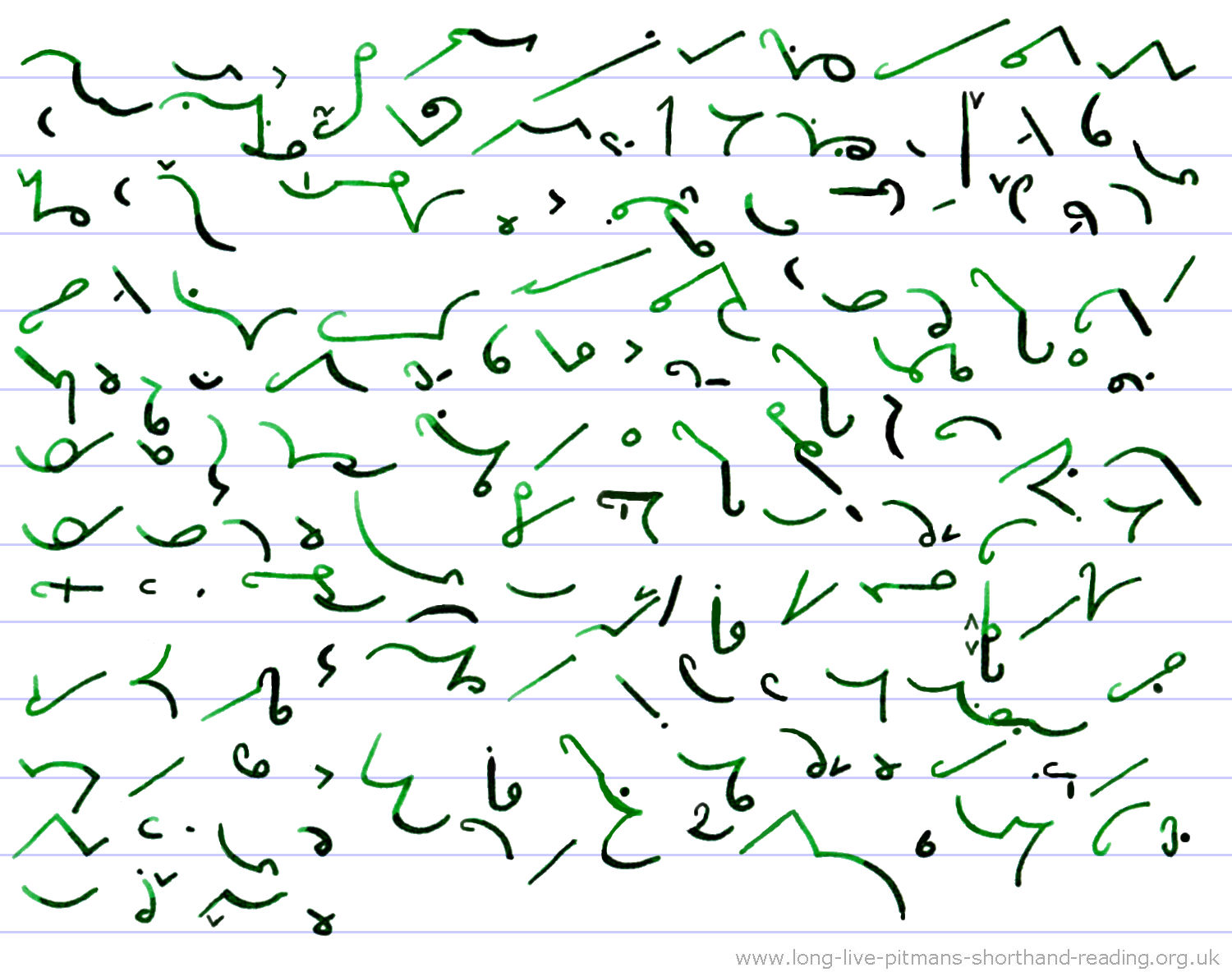
Moving now to the situation regarding the rear of our premises, we are
happy to report that maintenance operations are now complete and it only
remains to tidy up those few items that arrive unexpectedly. All the
consumables have been gathered and either stored or used up fairly
quickly, and we are hopeful that next year's production will be much
better. To this end we have pruned those parts of the fruit production
facilities as seemed necessary to us, so that the remaining branches are
as productive as possible, although more reshaping may be necessary next
year. Future satisfactory growth in all areas will only occur with a
corresponding improvement in meteorological conditions, which are of
course outside of our control, but we assure readers that the management
are putting every effort into investigating* ways to match our efforts
to the changing conditions prevailing in these areas. We conclude our
report with a few words from our shorthand reporter, who is fortunately
well trained in concise writing.
* "inves(t)igating" Omits the T
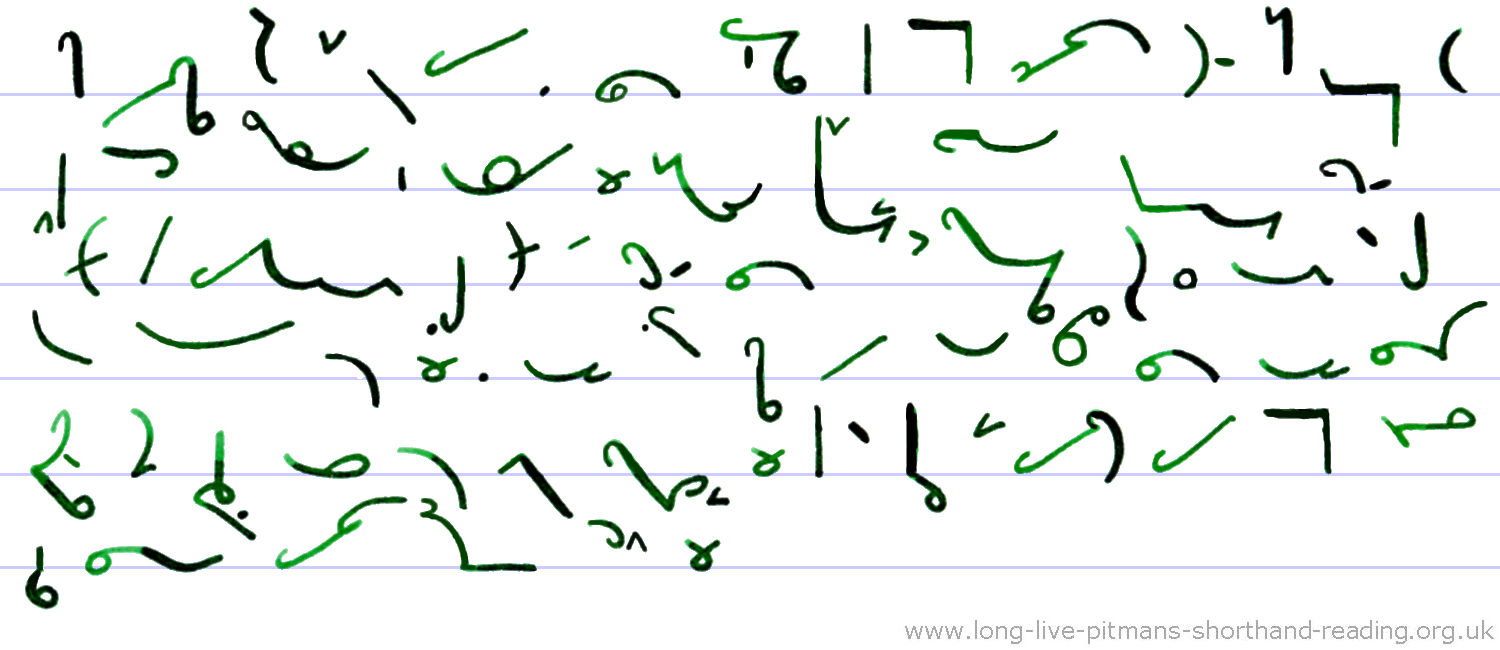
"Dear Readers, Although I put away the summer clothes, it got warmer, so
I had to get them out again, surprising but necessary. I finished
tidying the garden, picking the fruit (which we have now eaten) and
pruned some of the branches, so that is now all done for another year.
The new apple trees are in, as well as some new small shrubs, so the
display next year should be brilliant. It all depends on the weather we
get, of course, but that is something we will work around." (642 words)
Top of page
|
|
